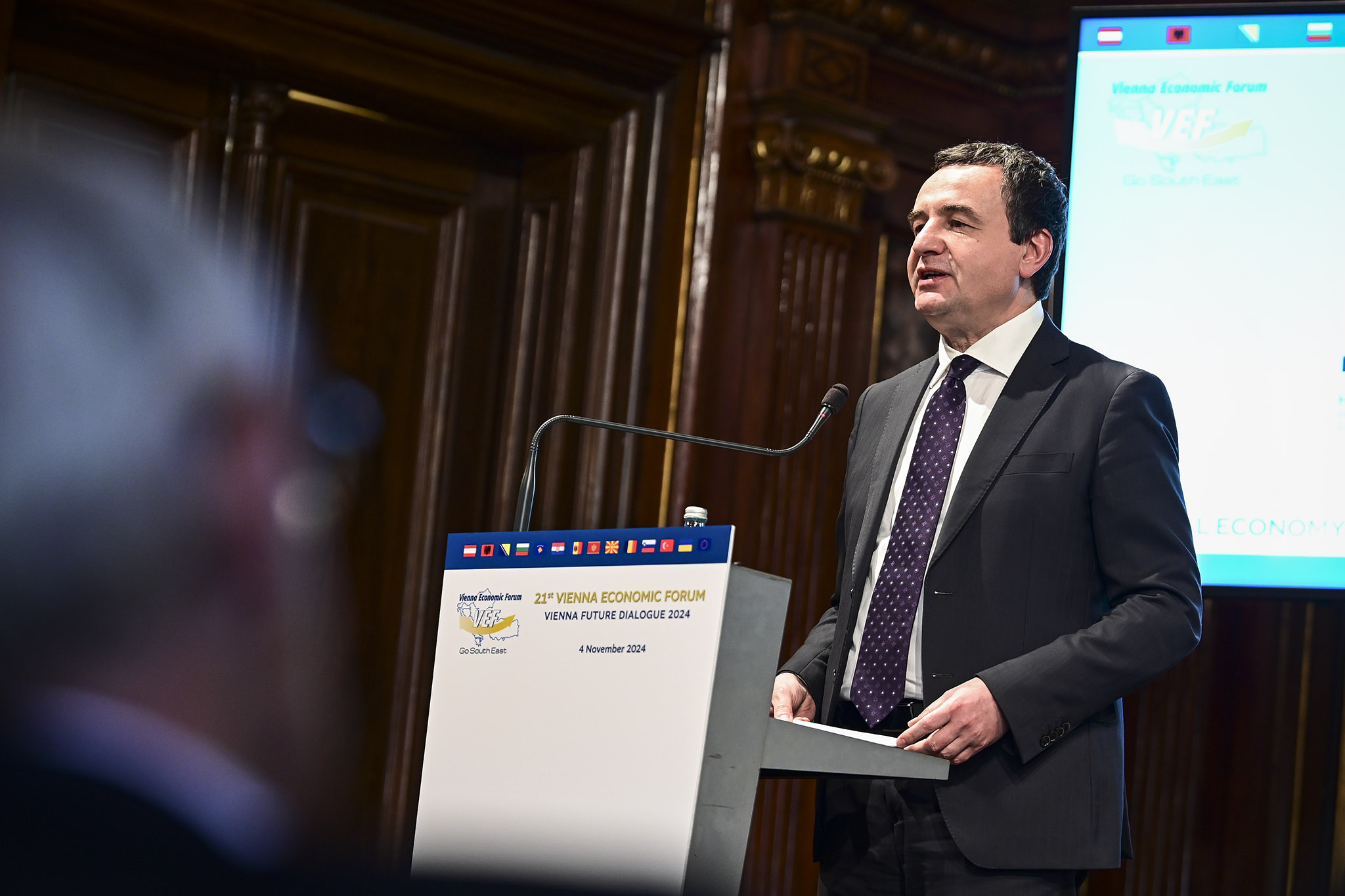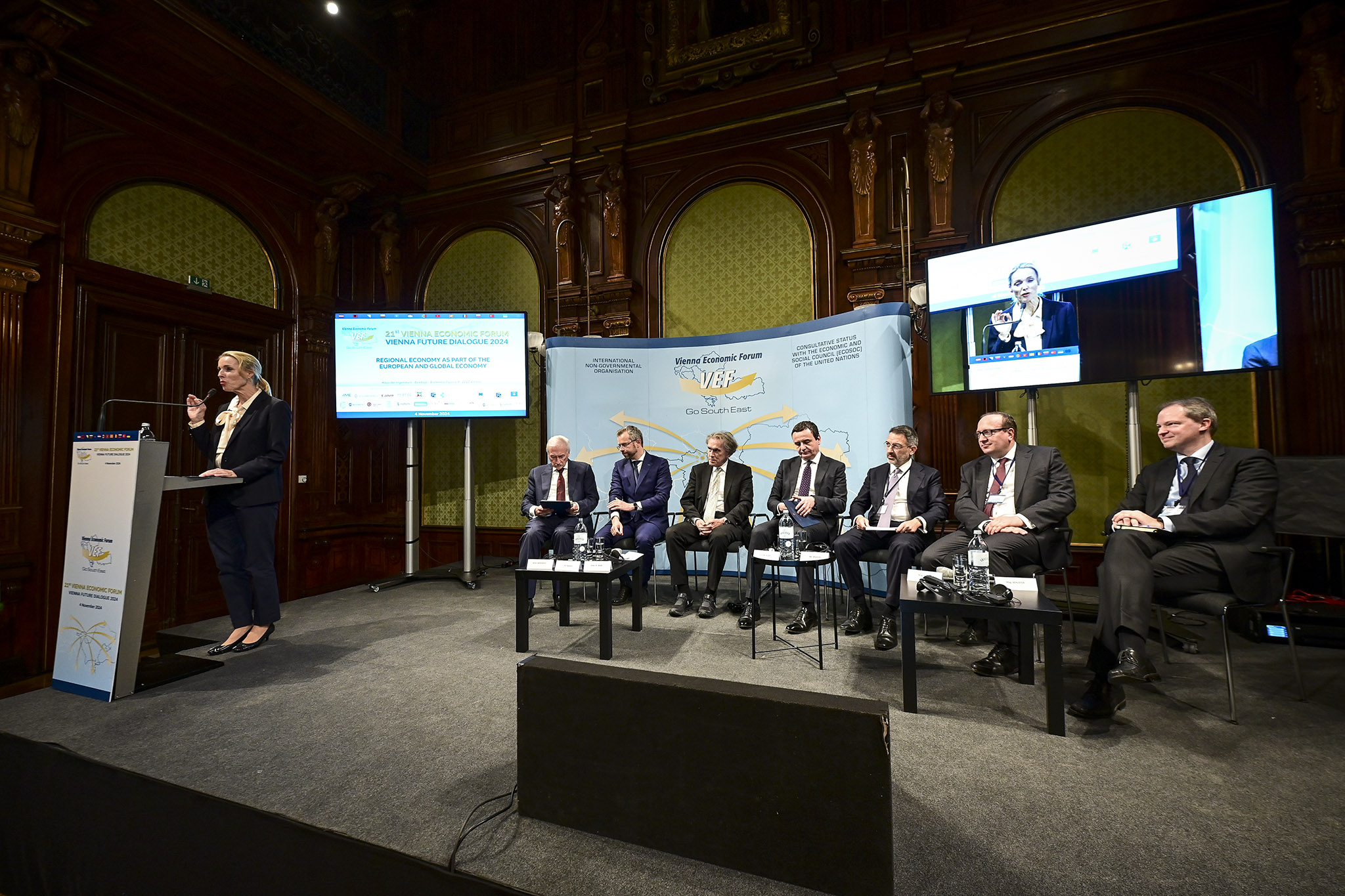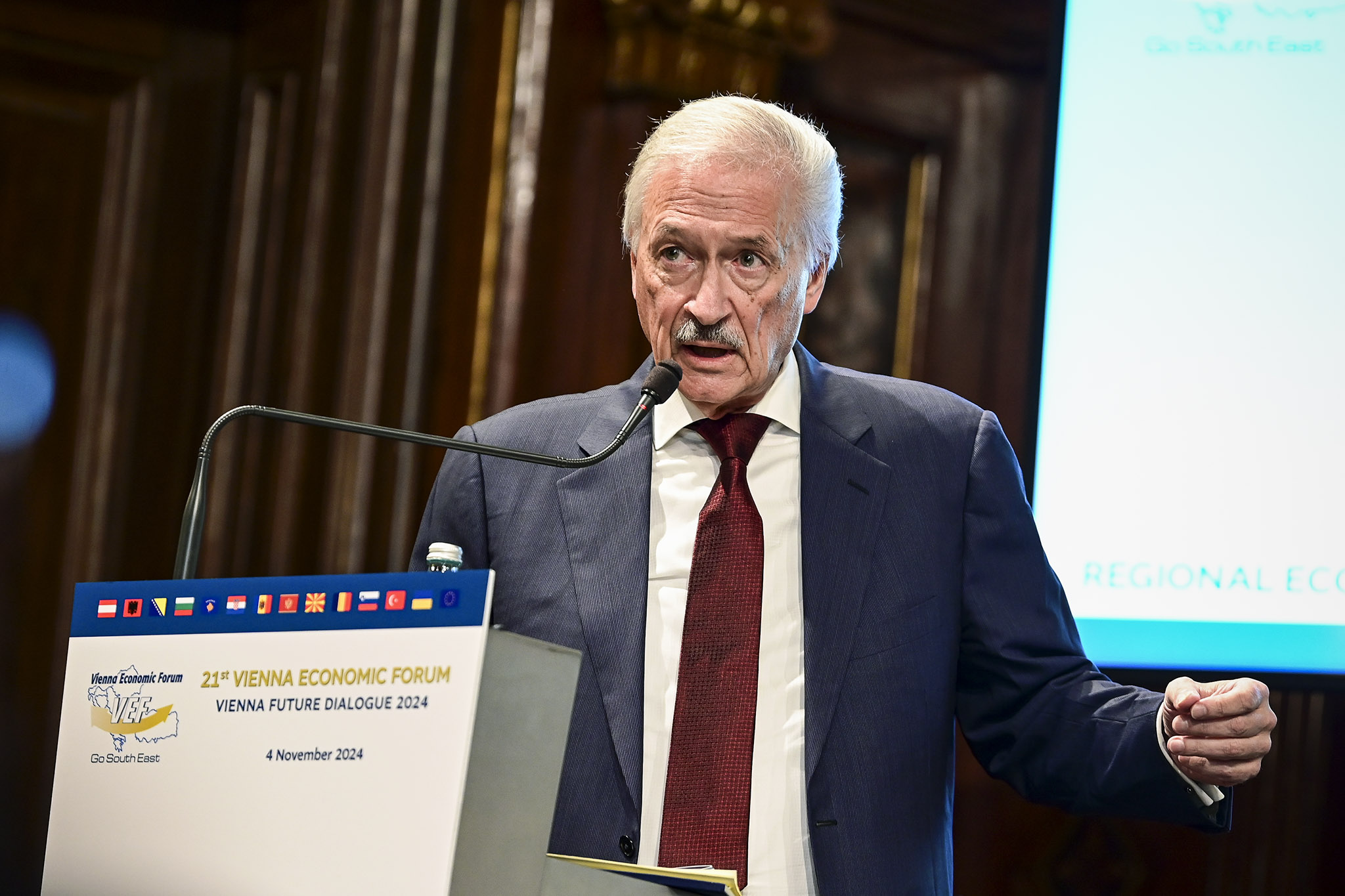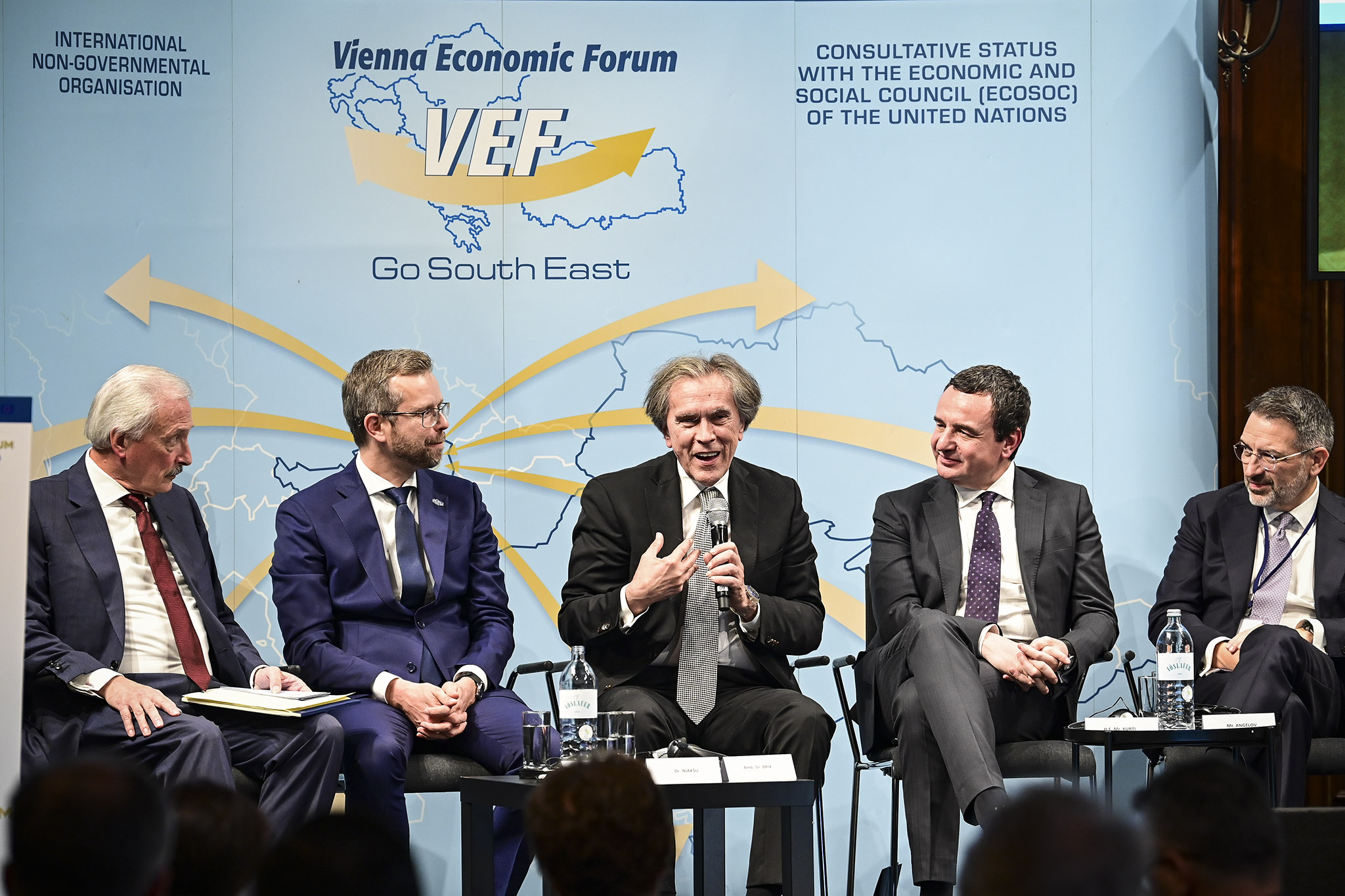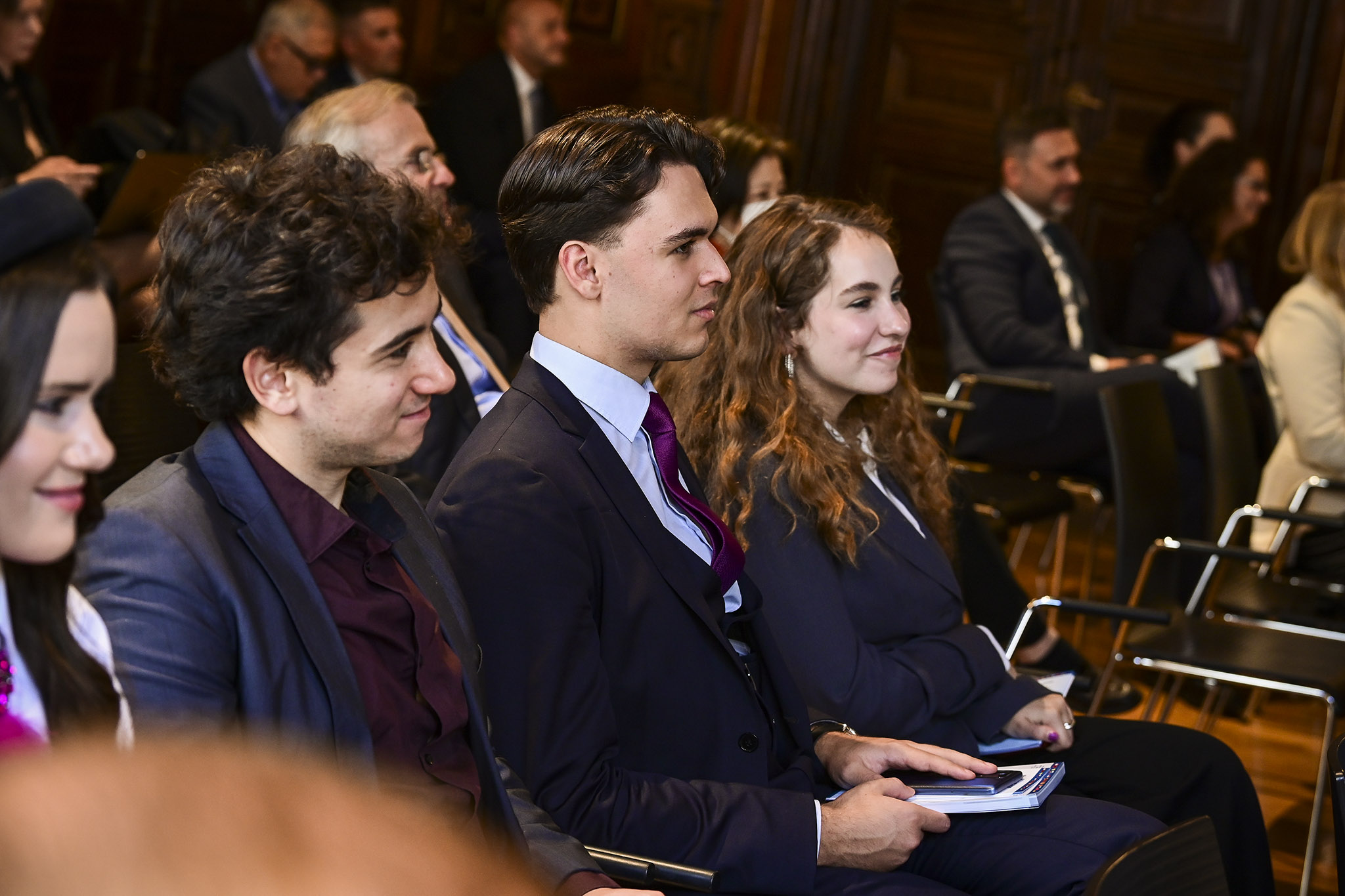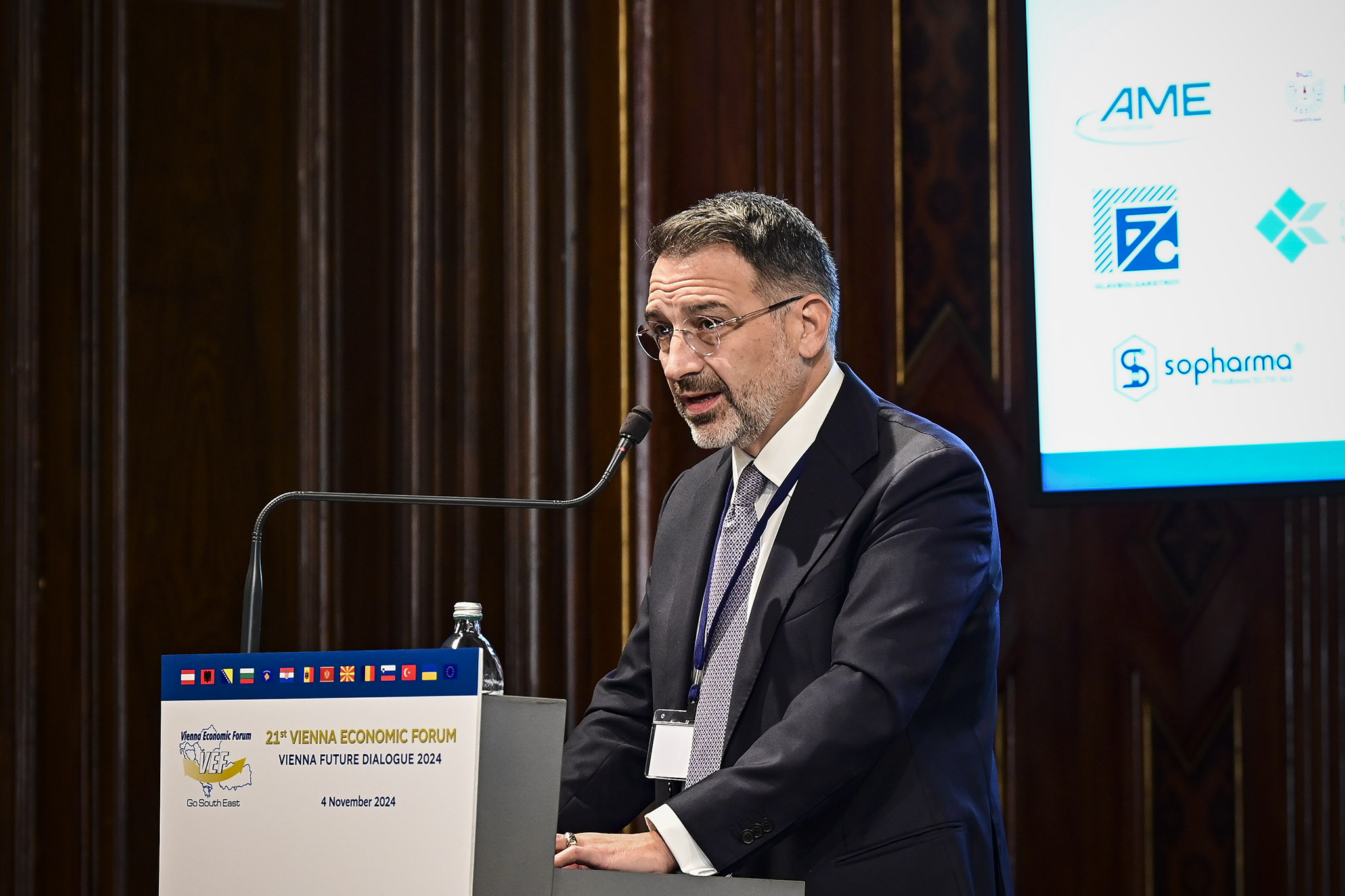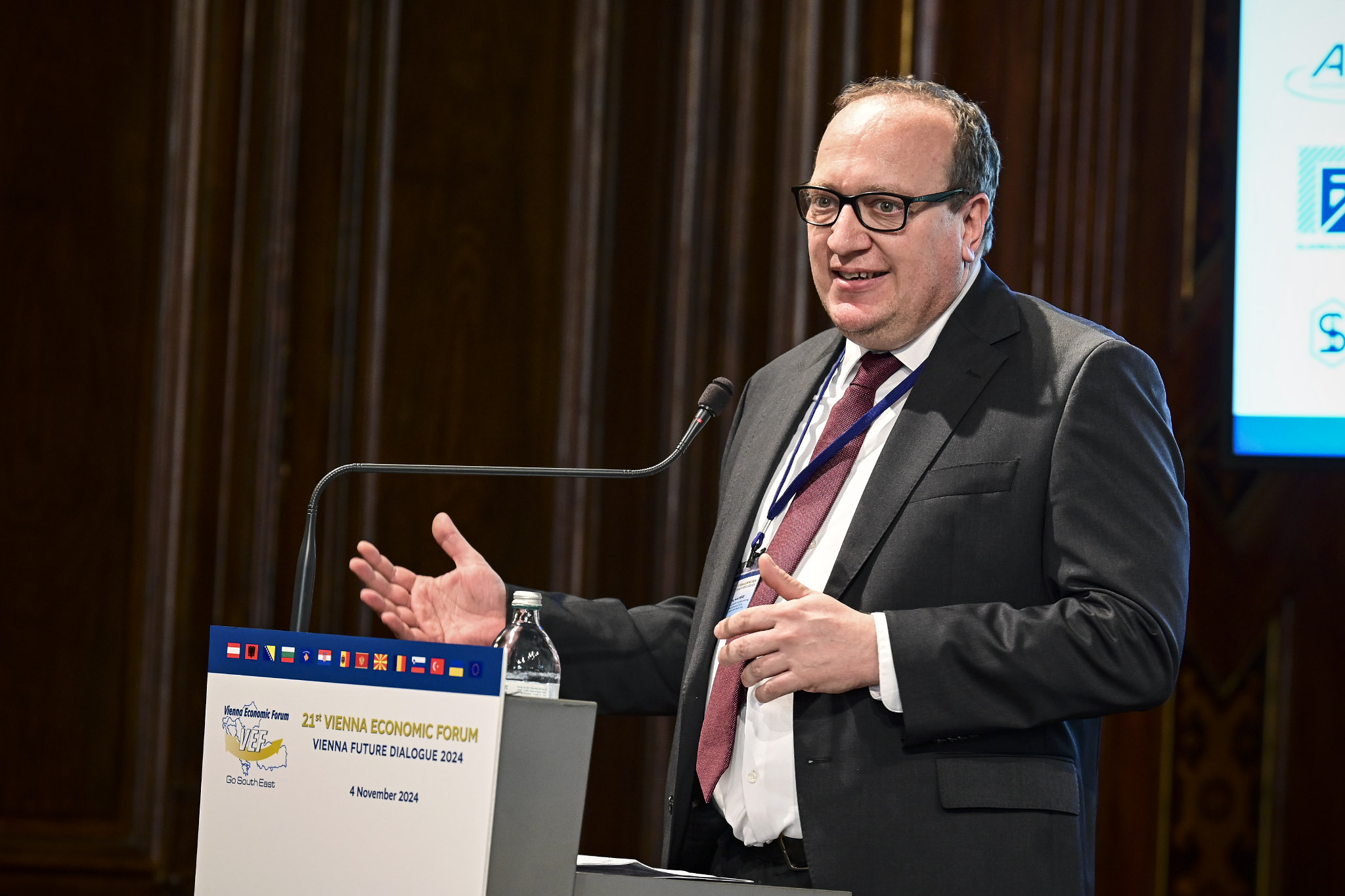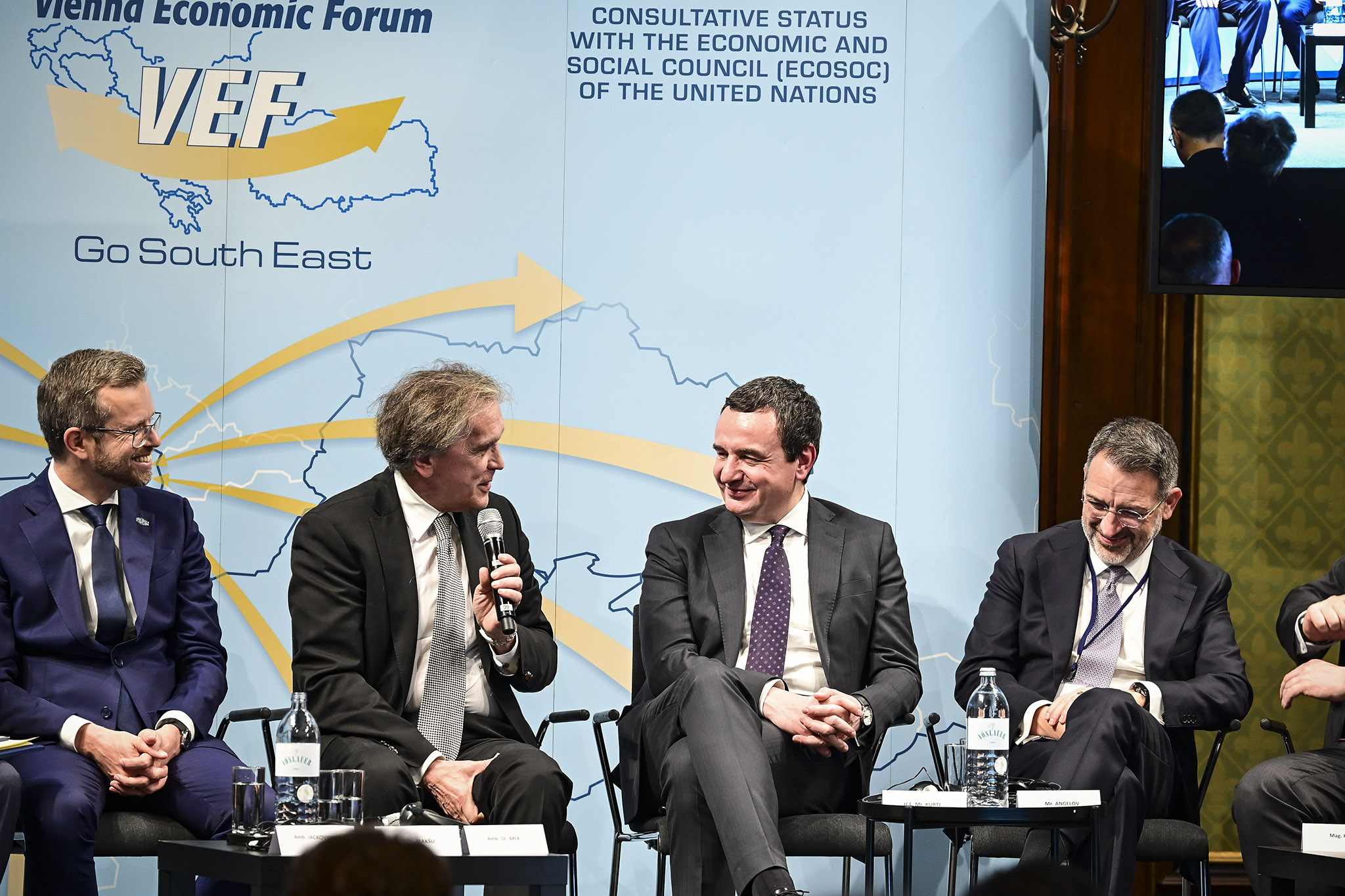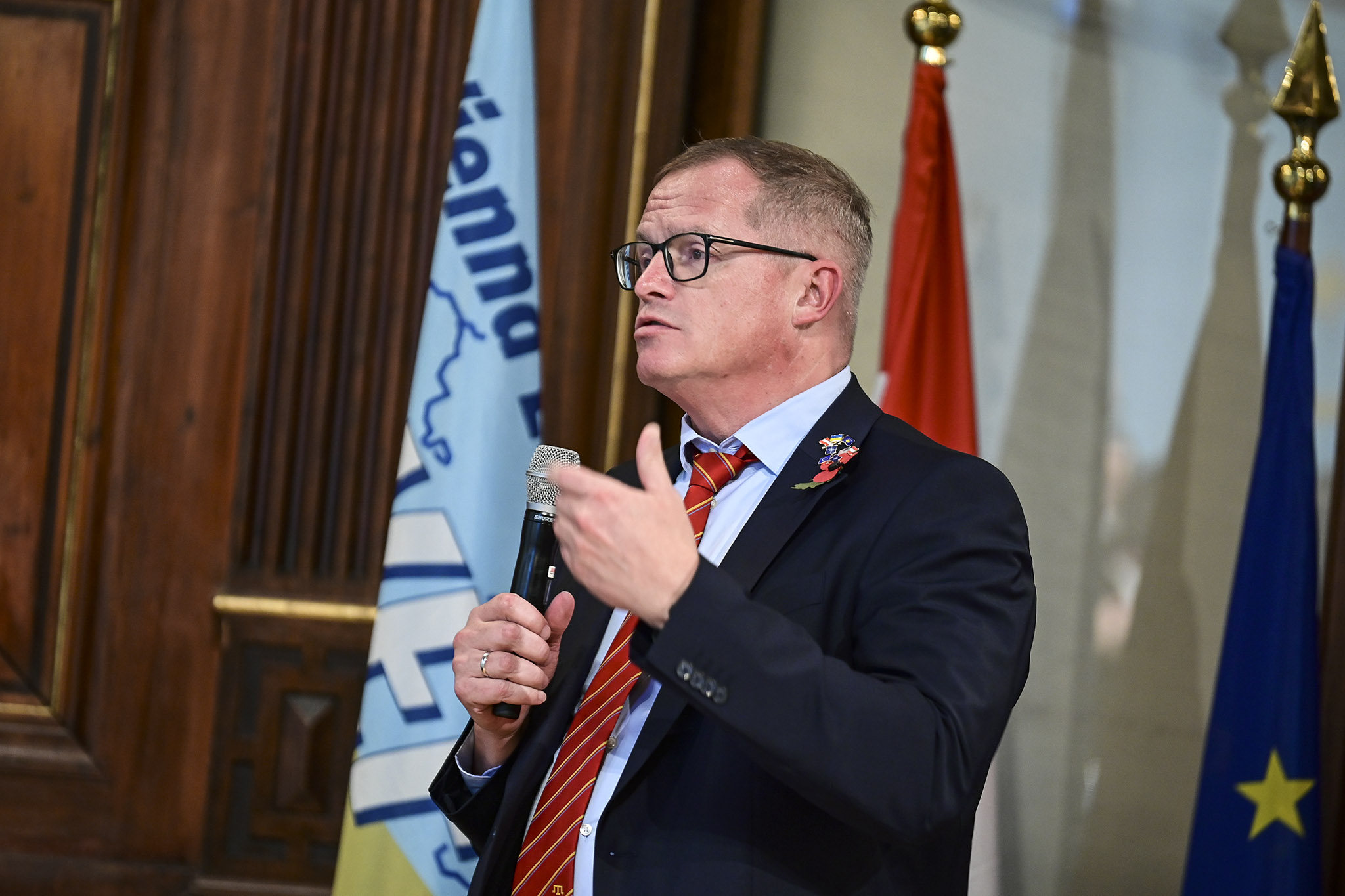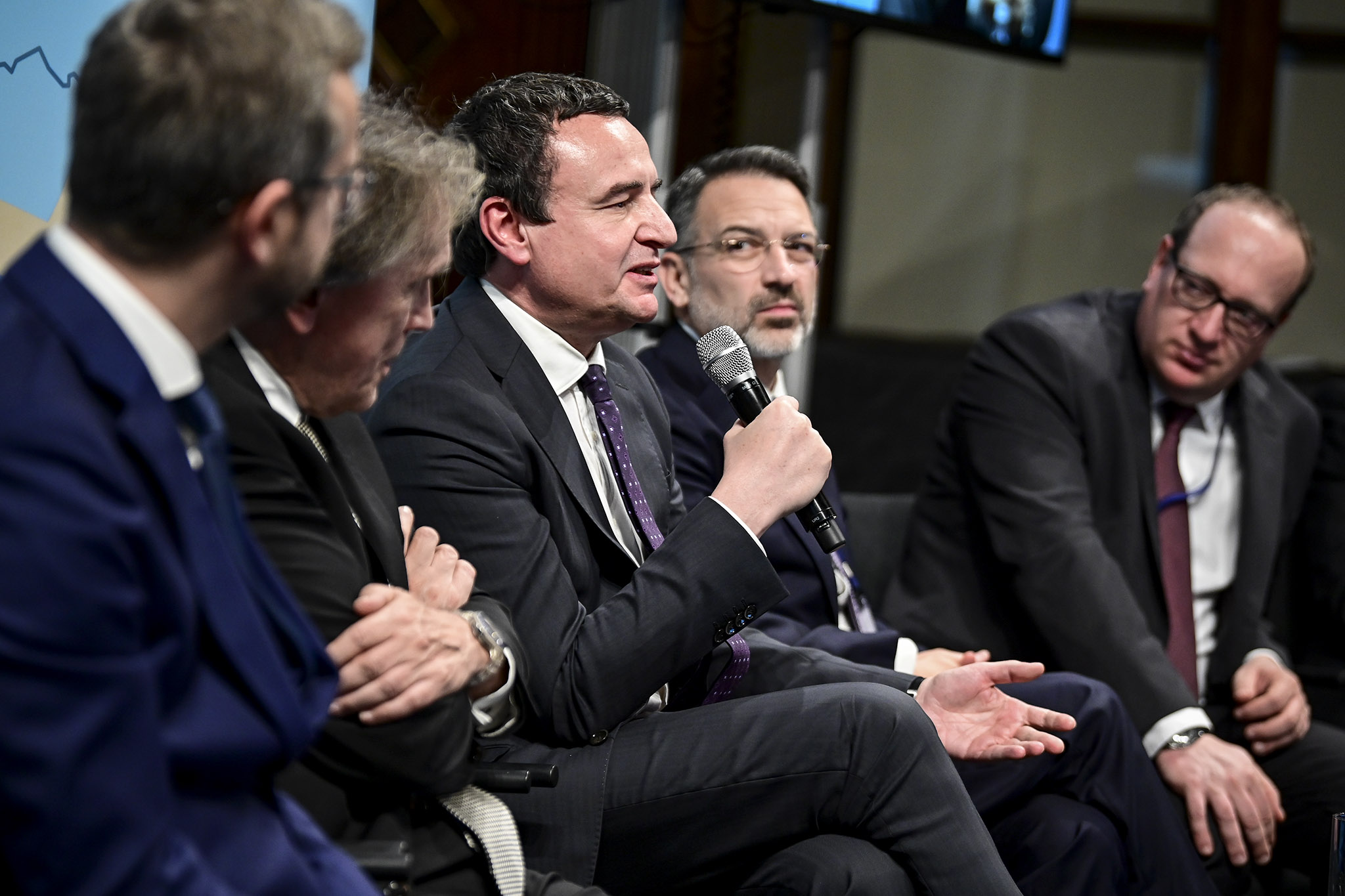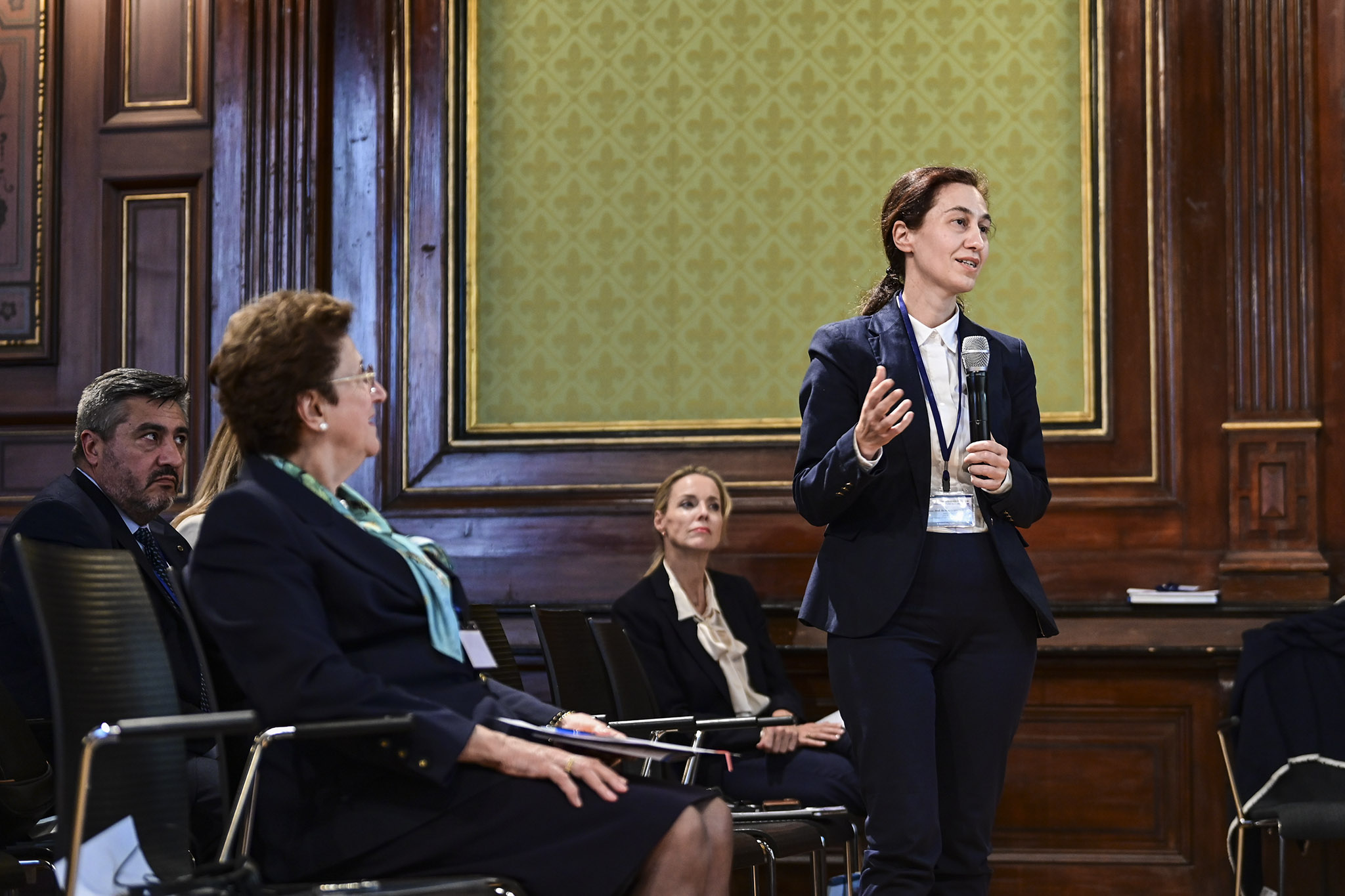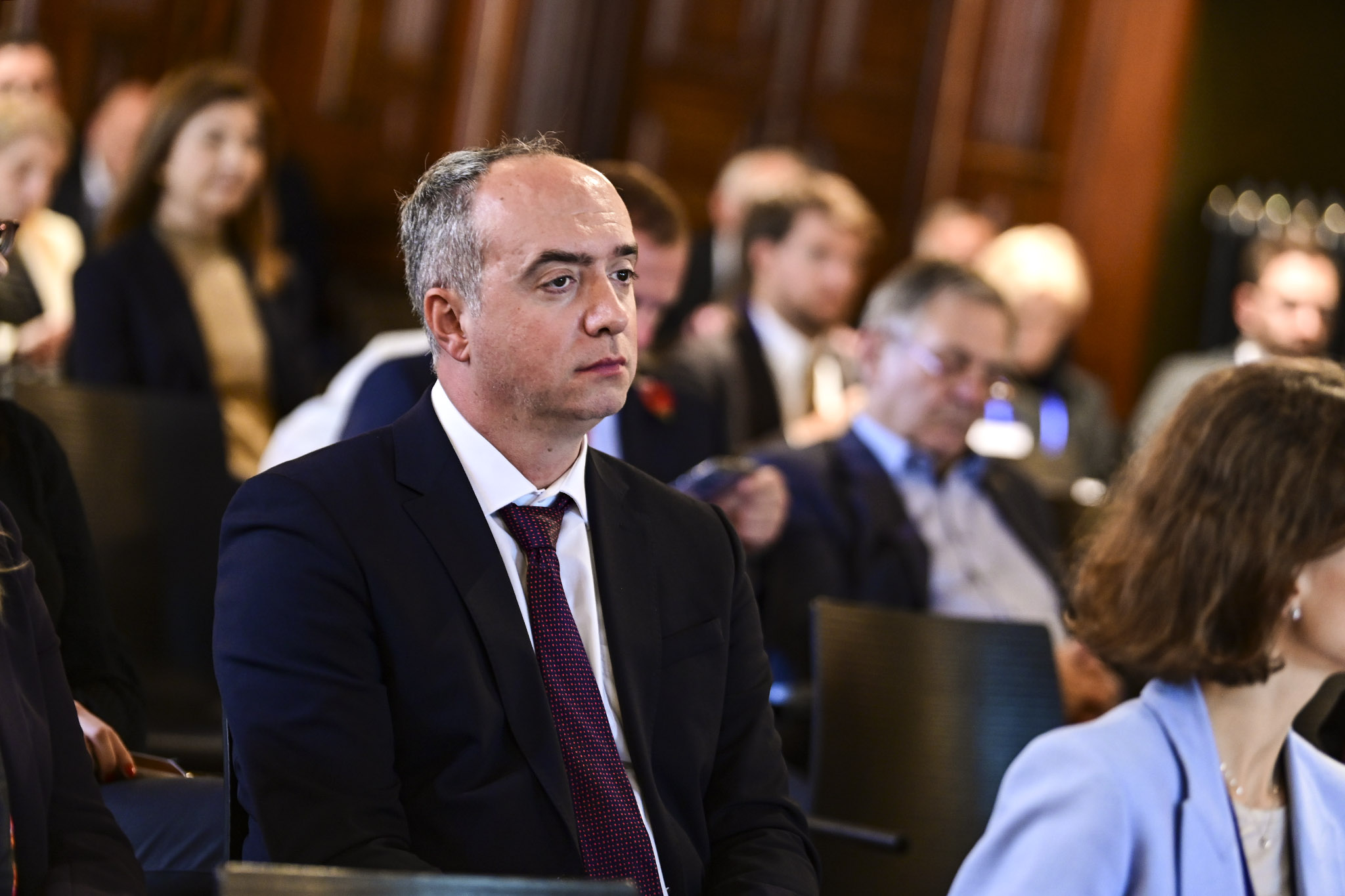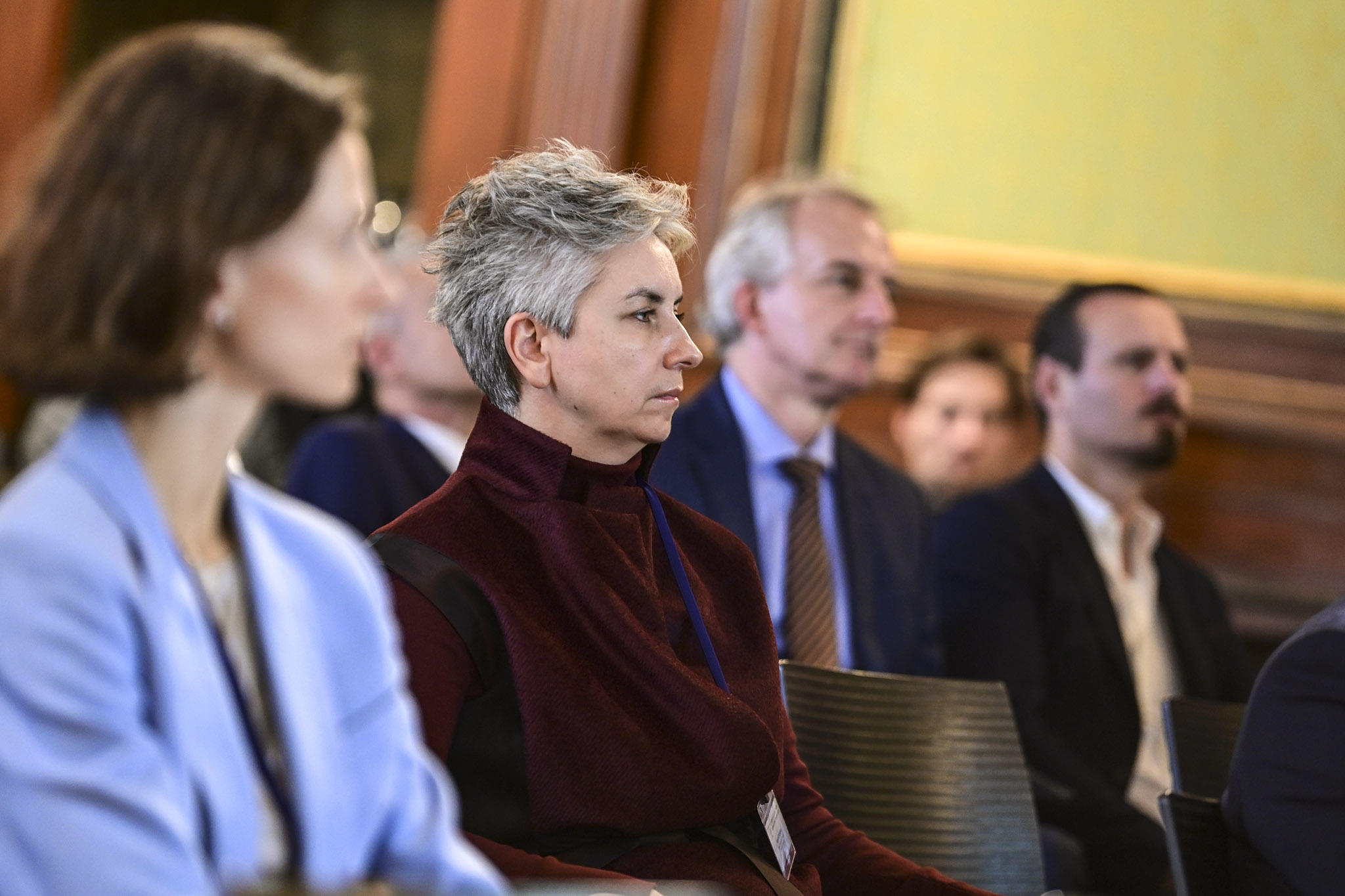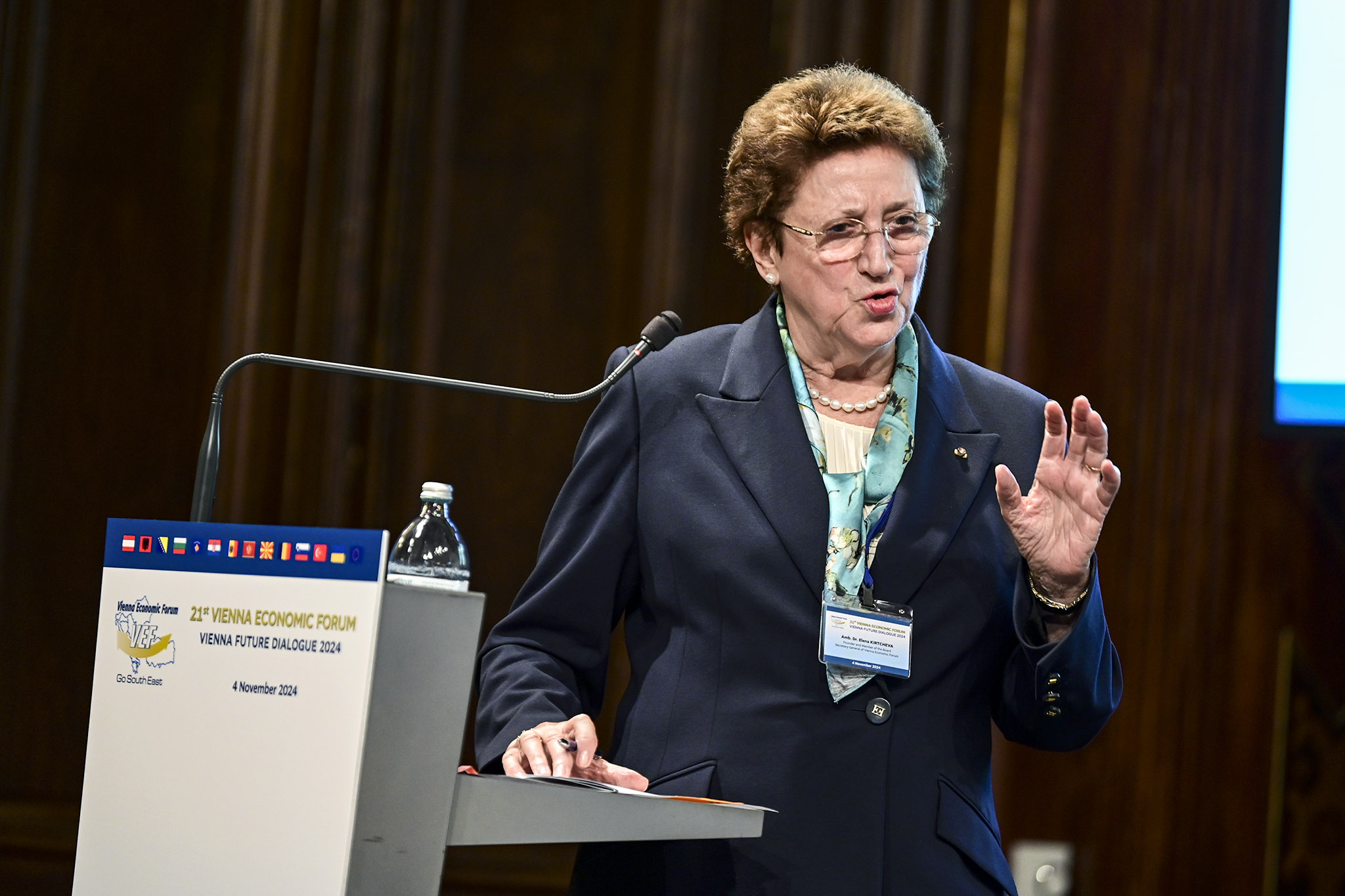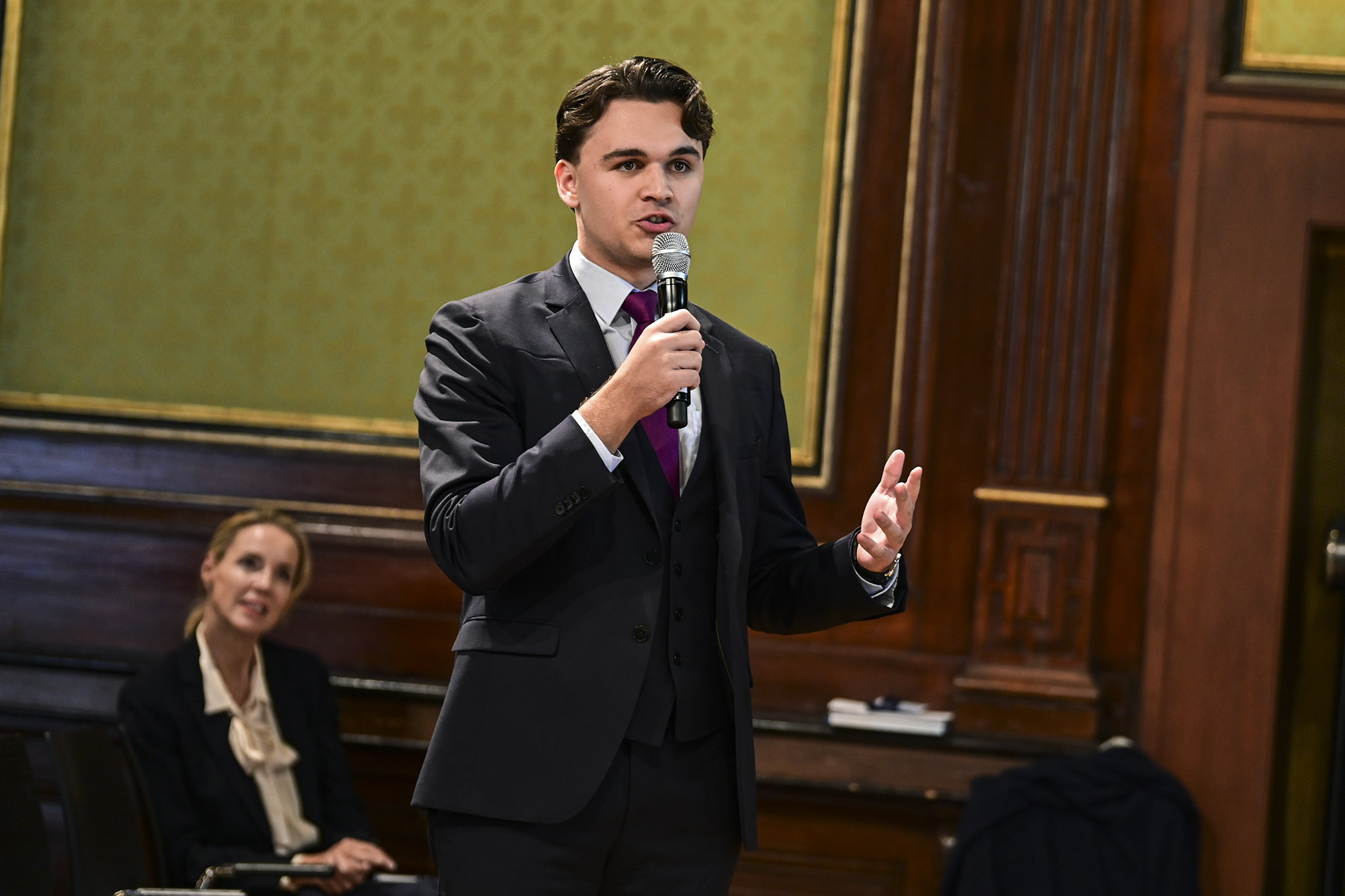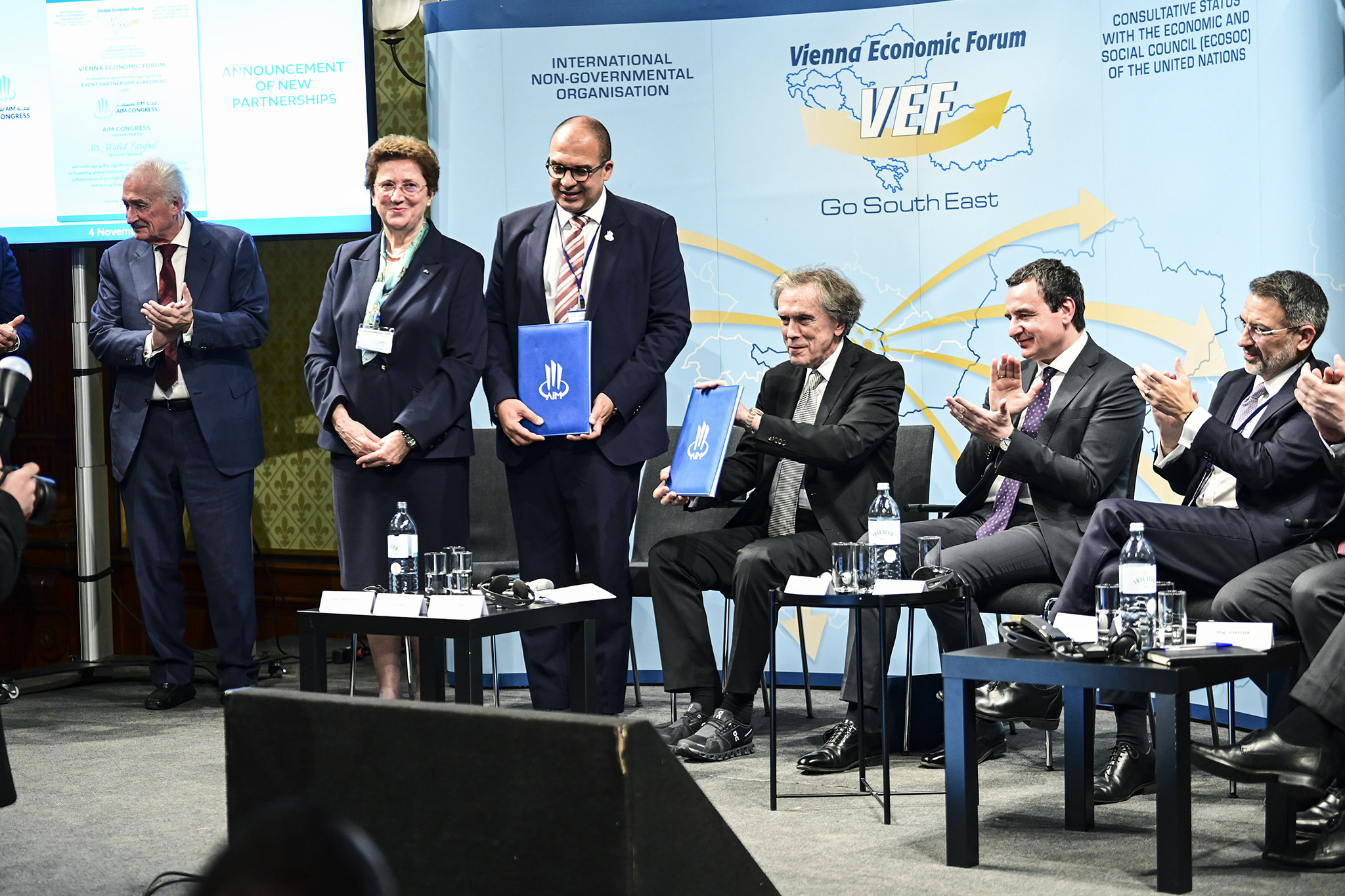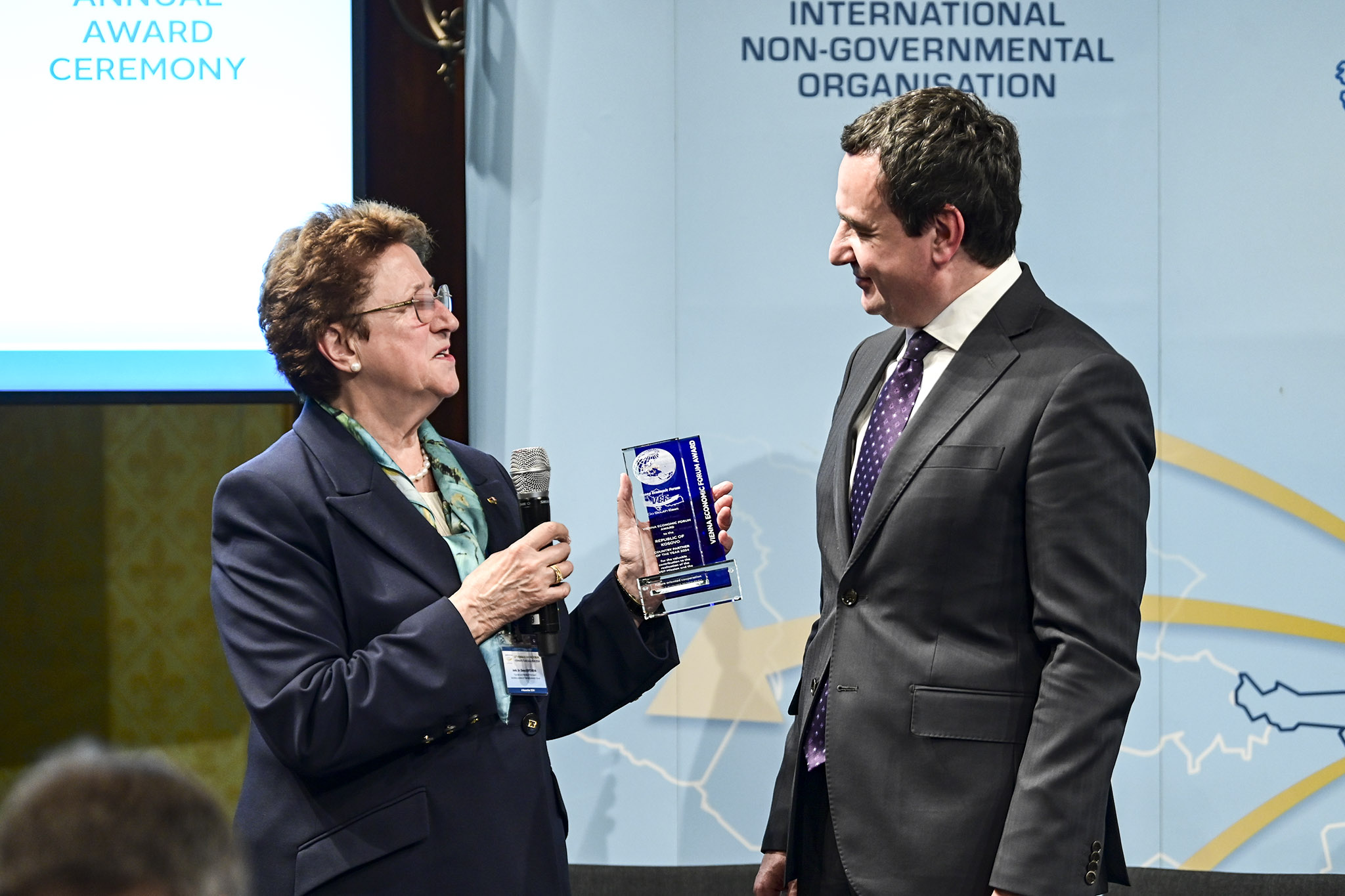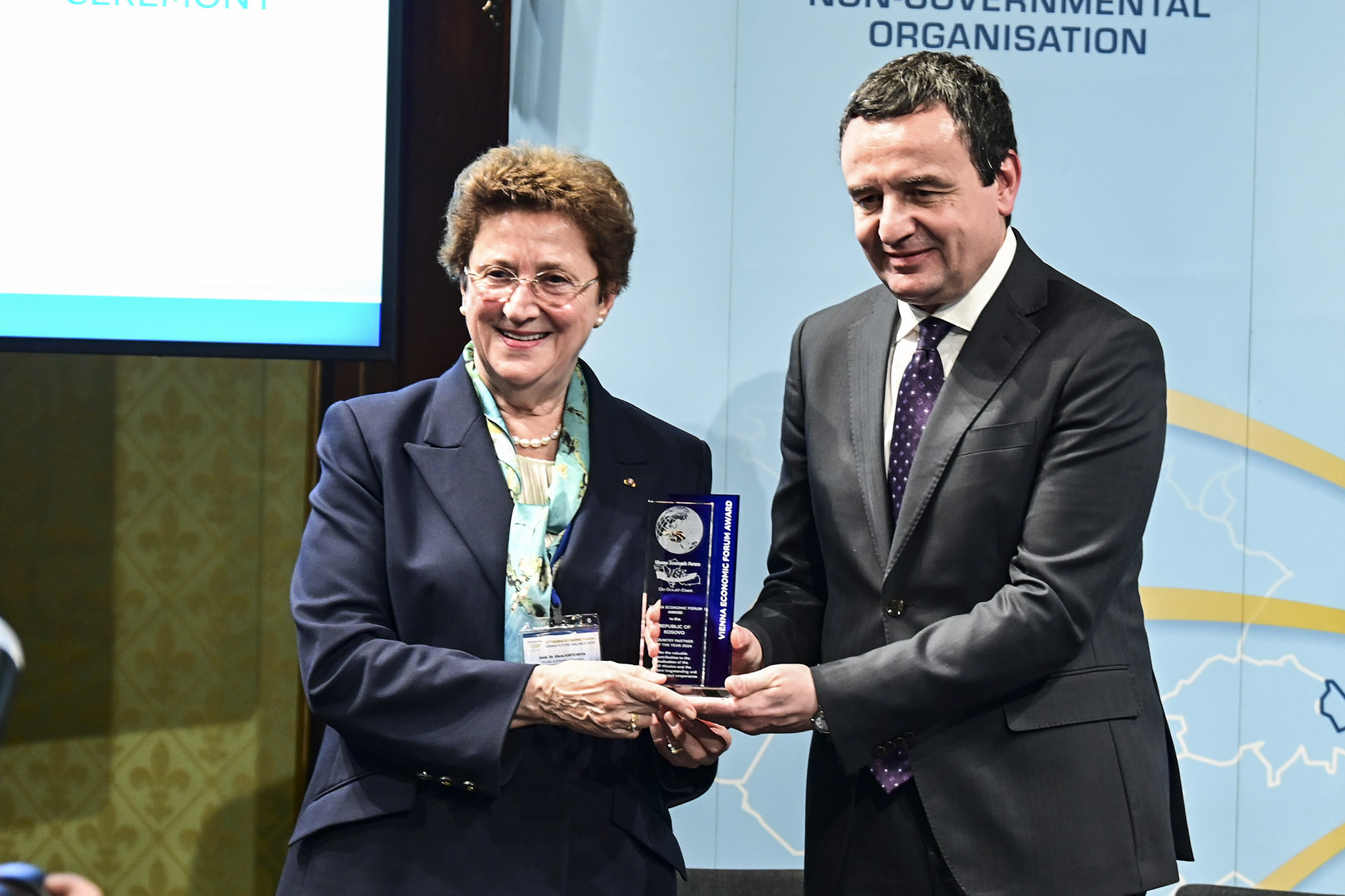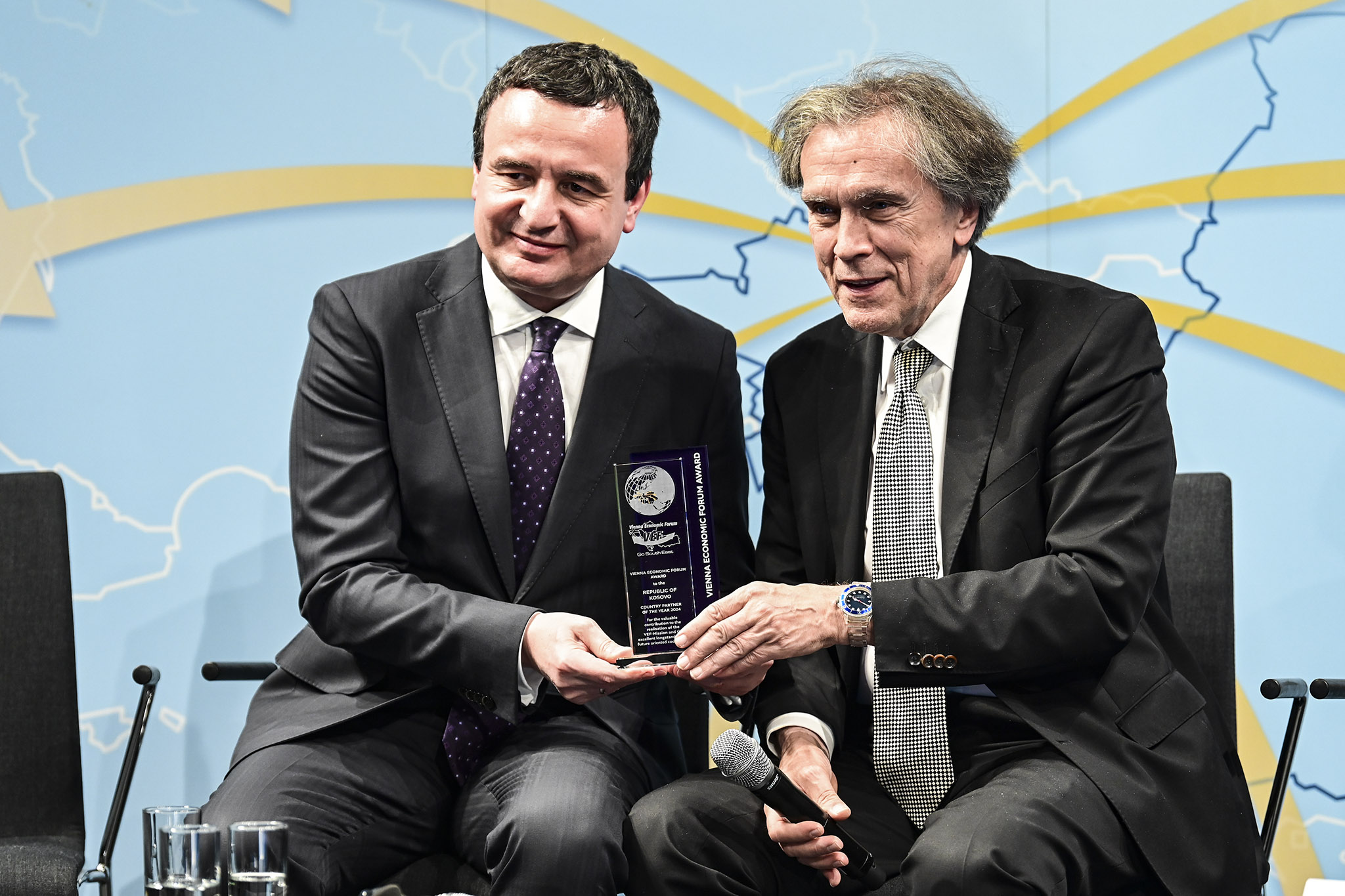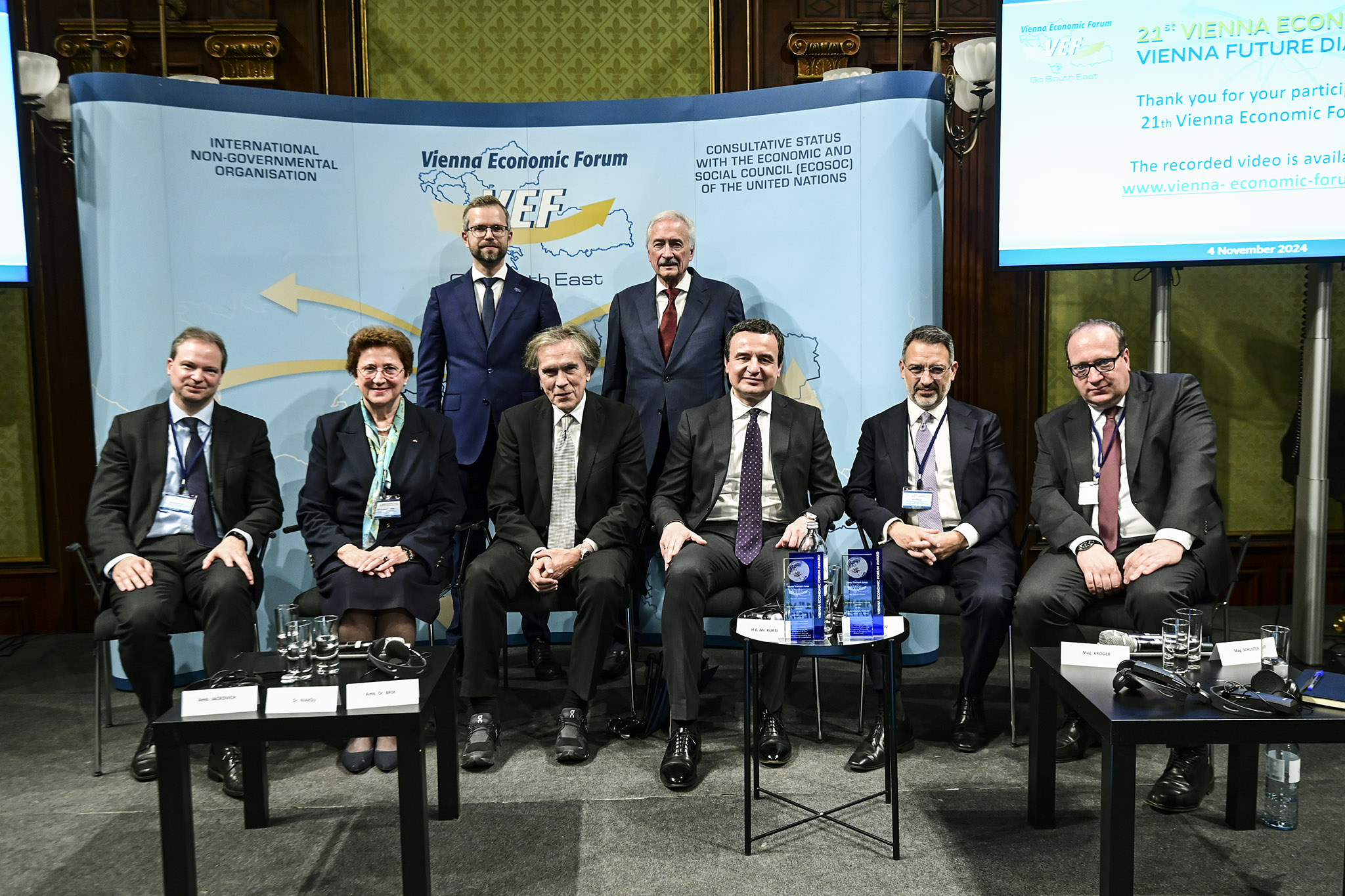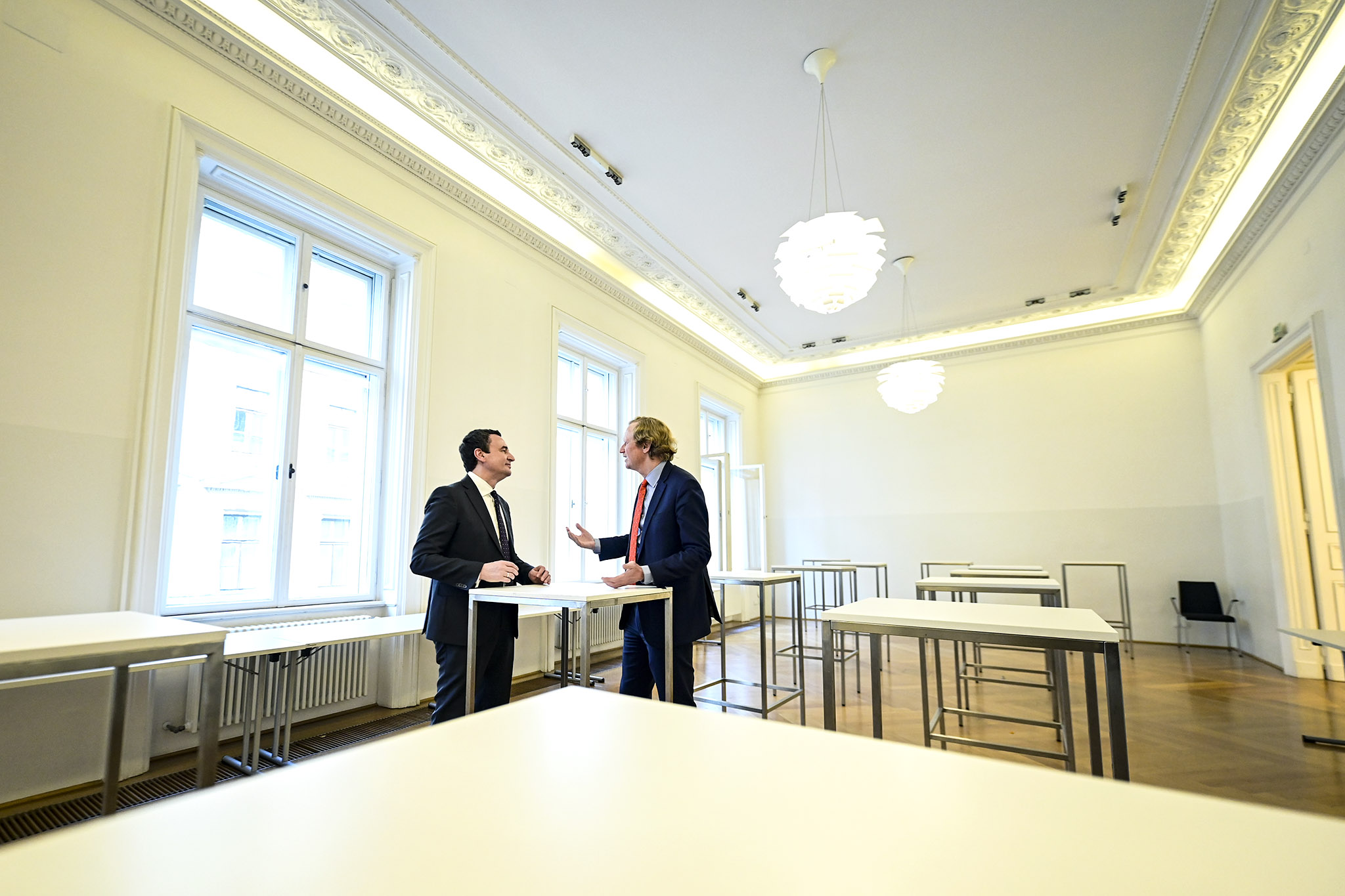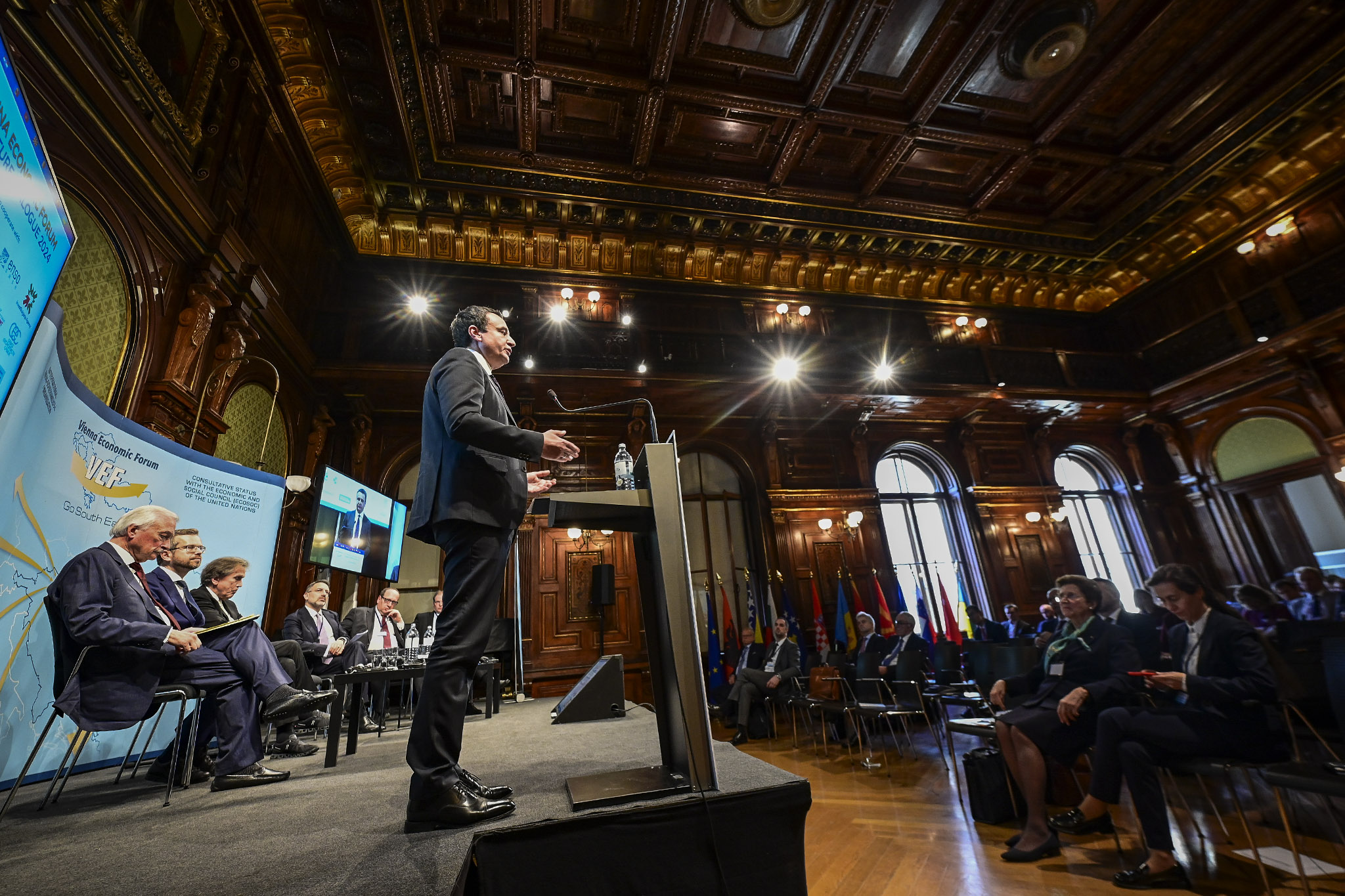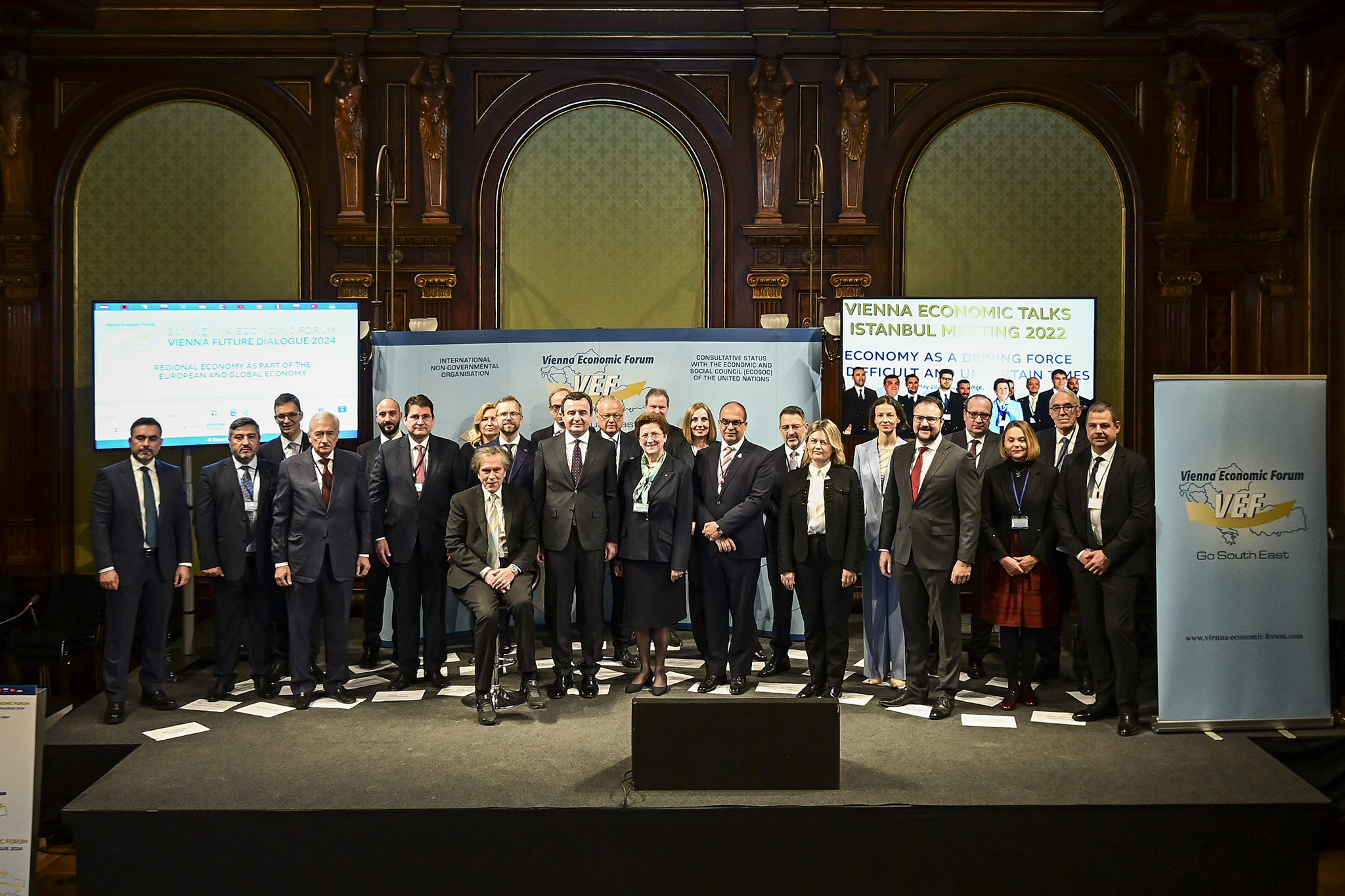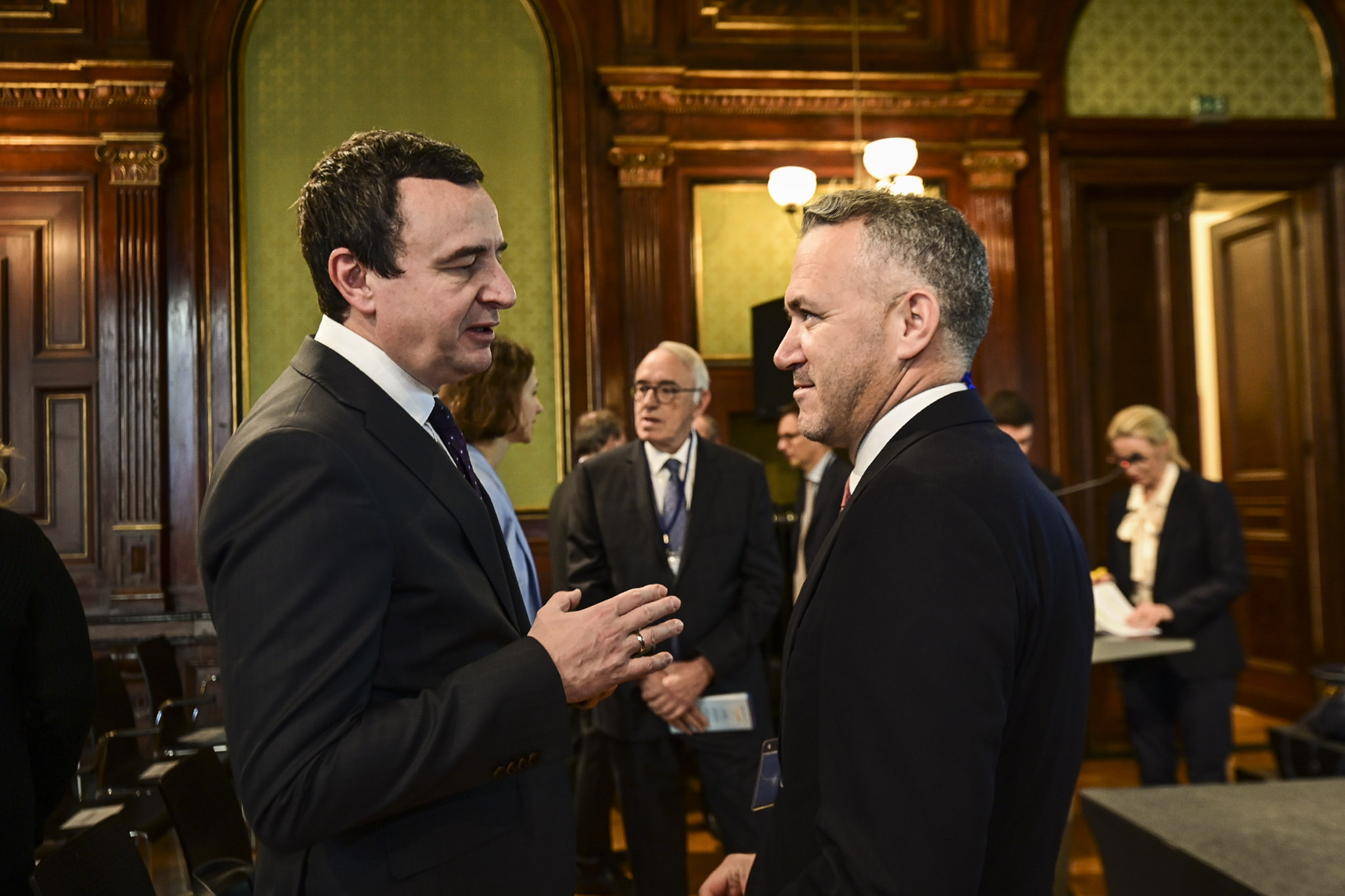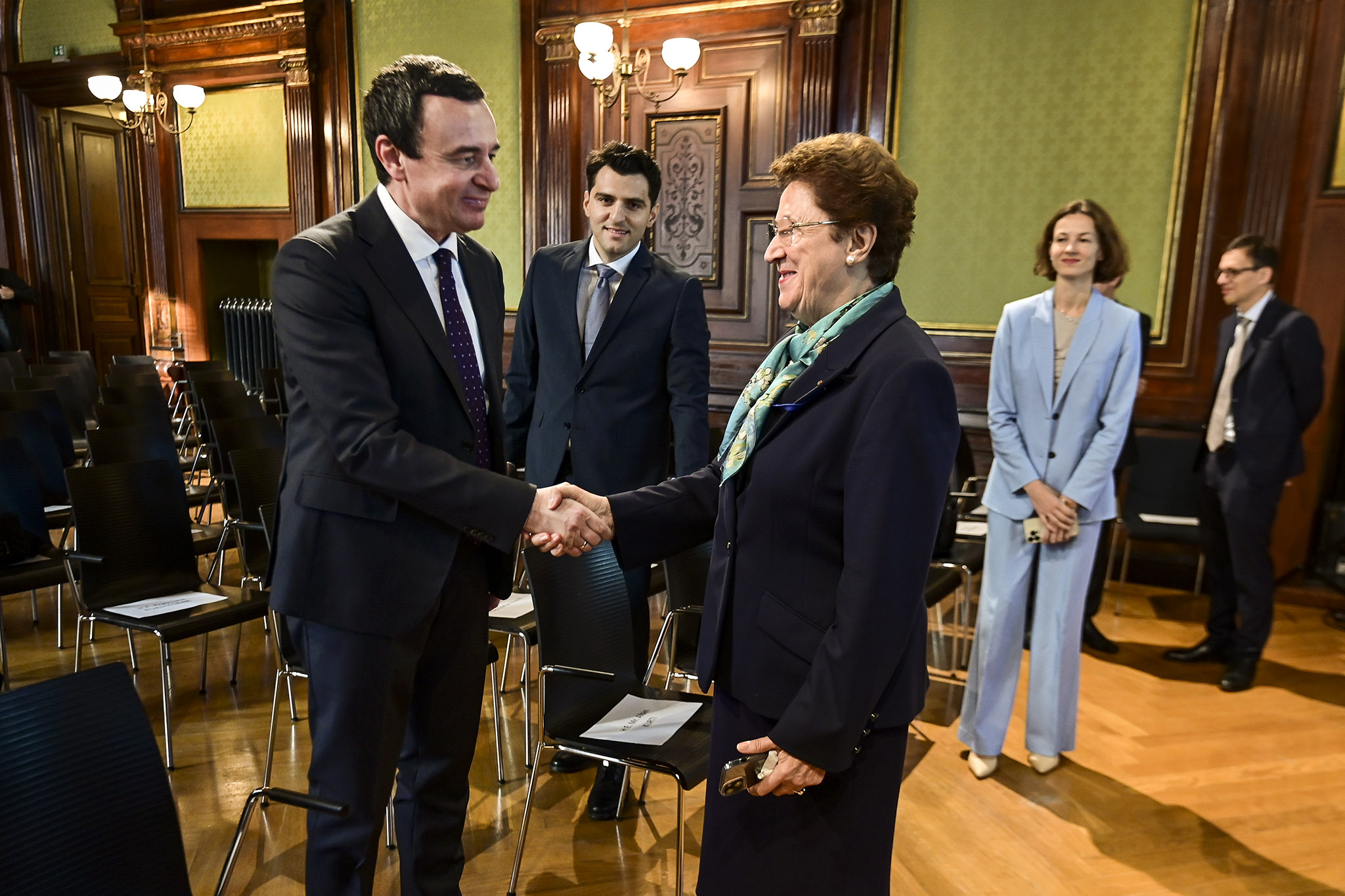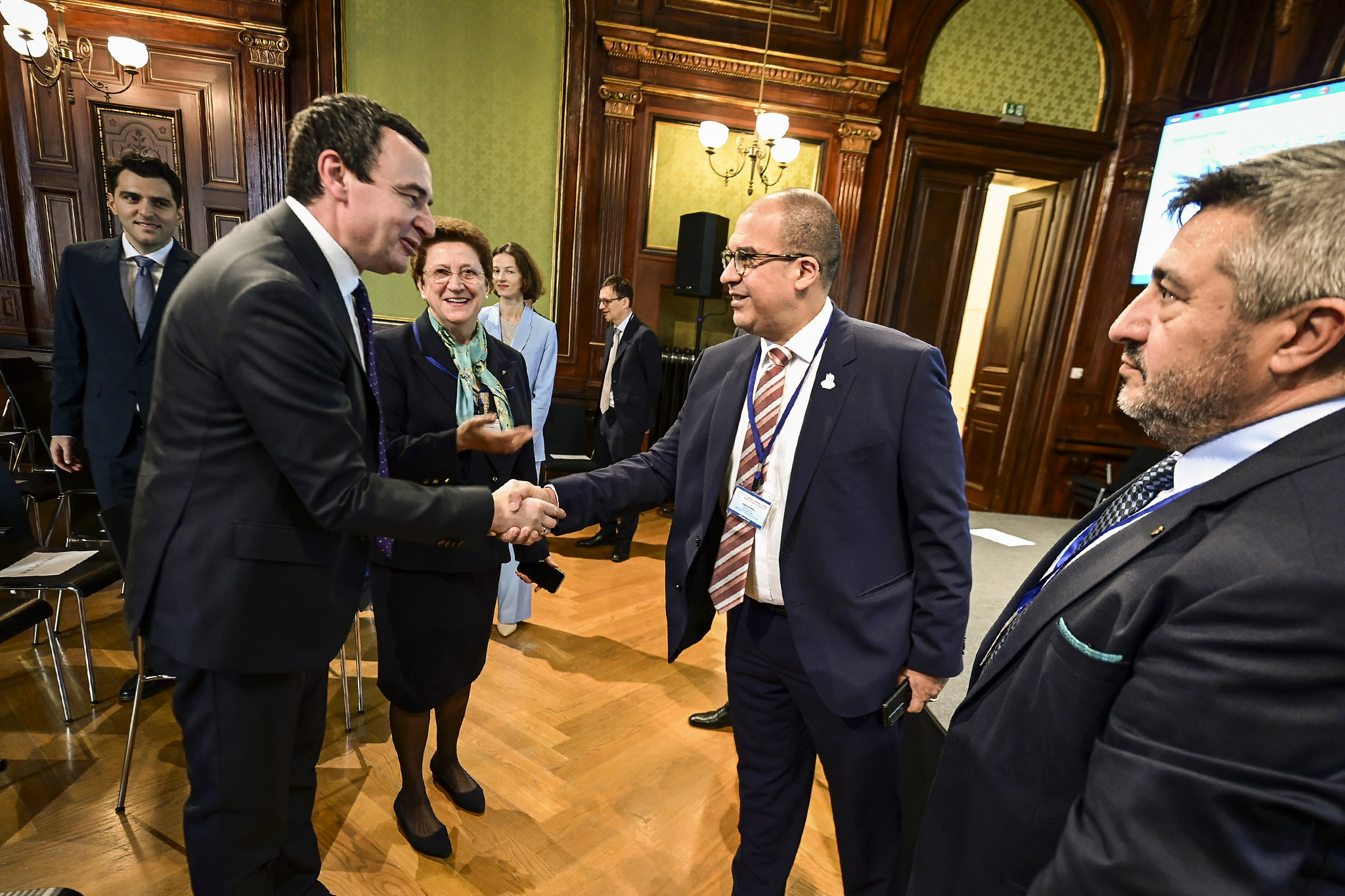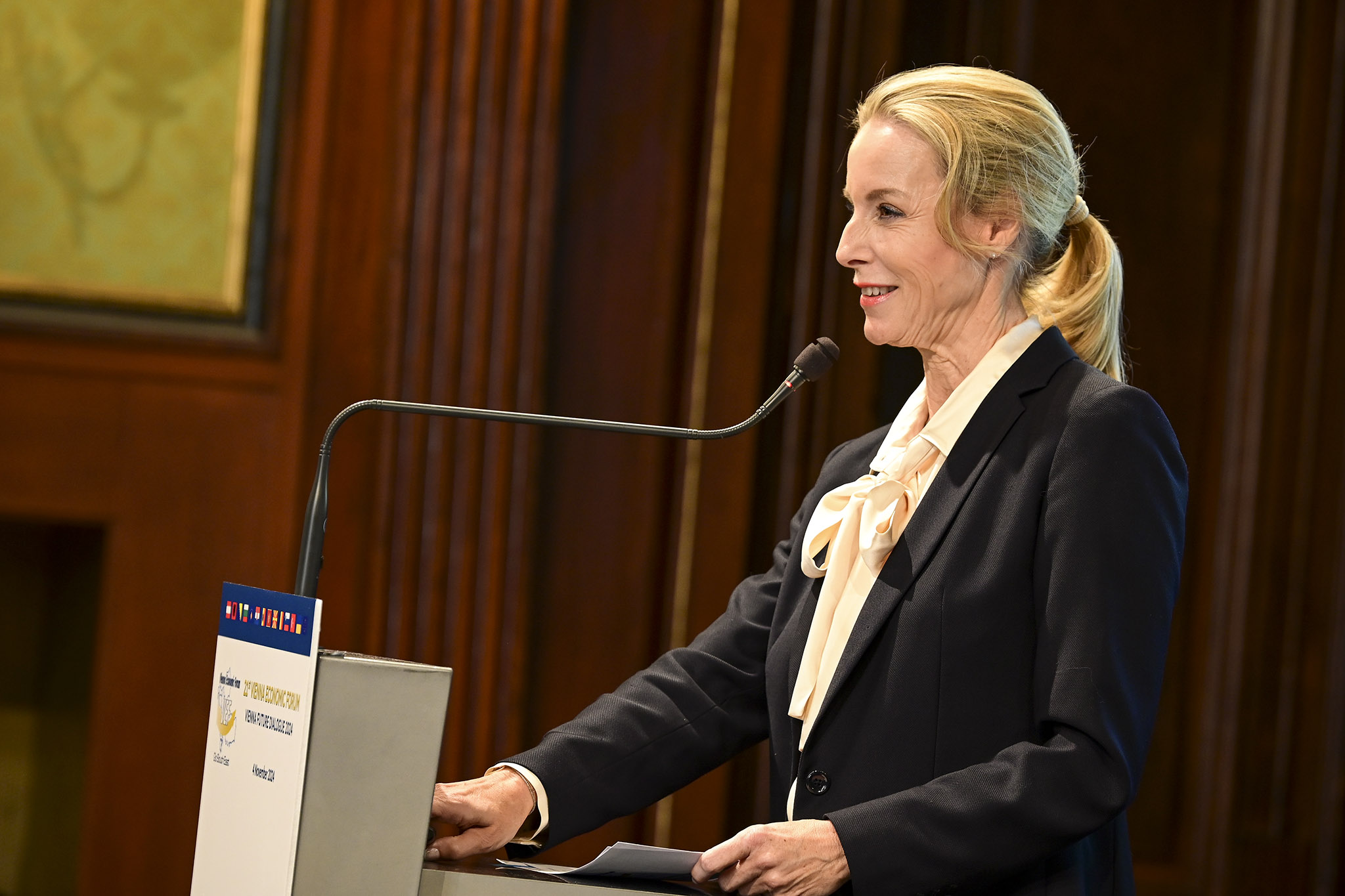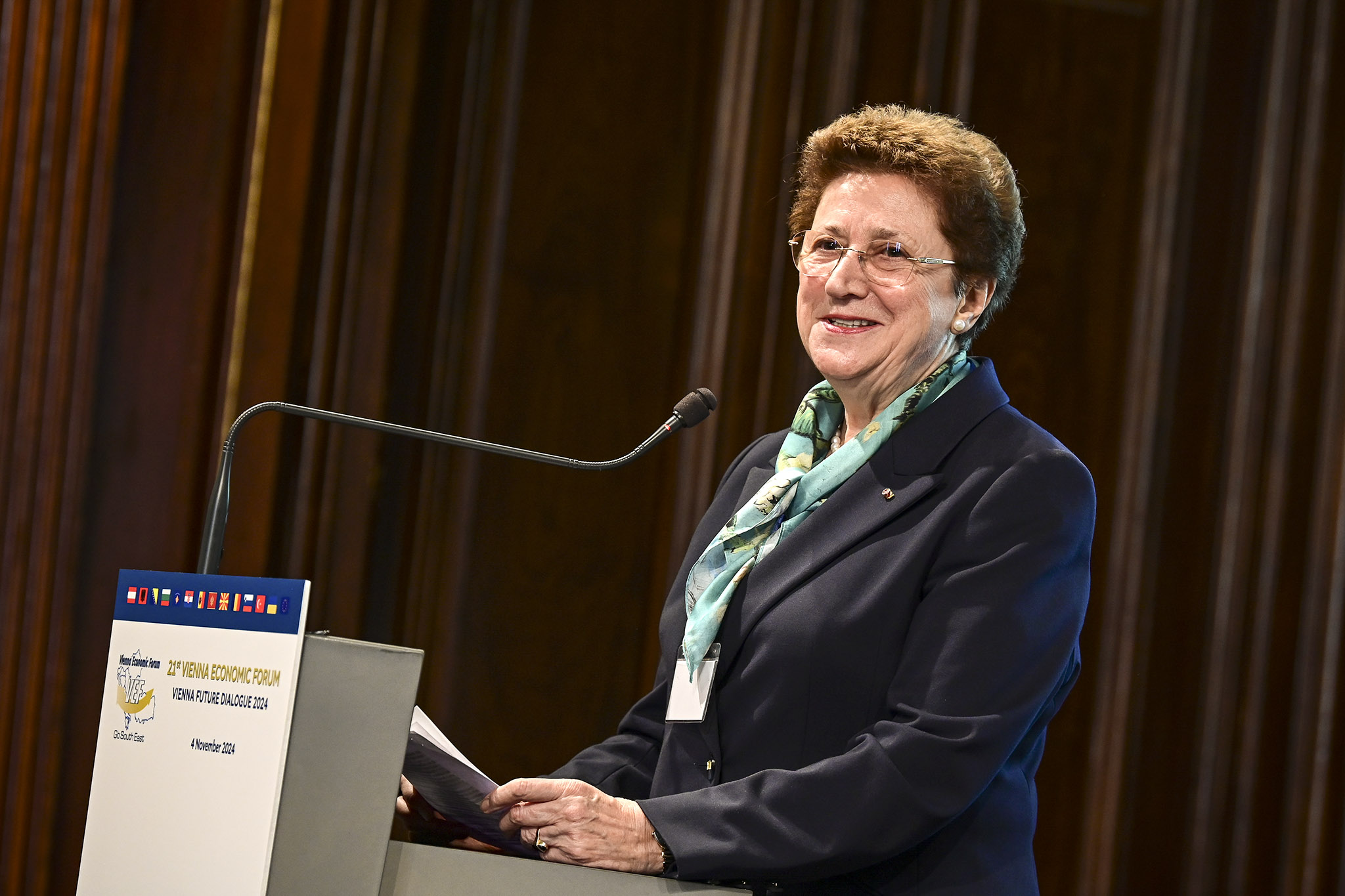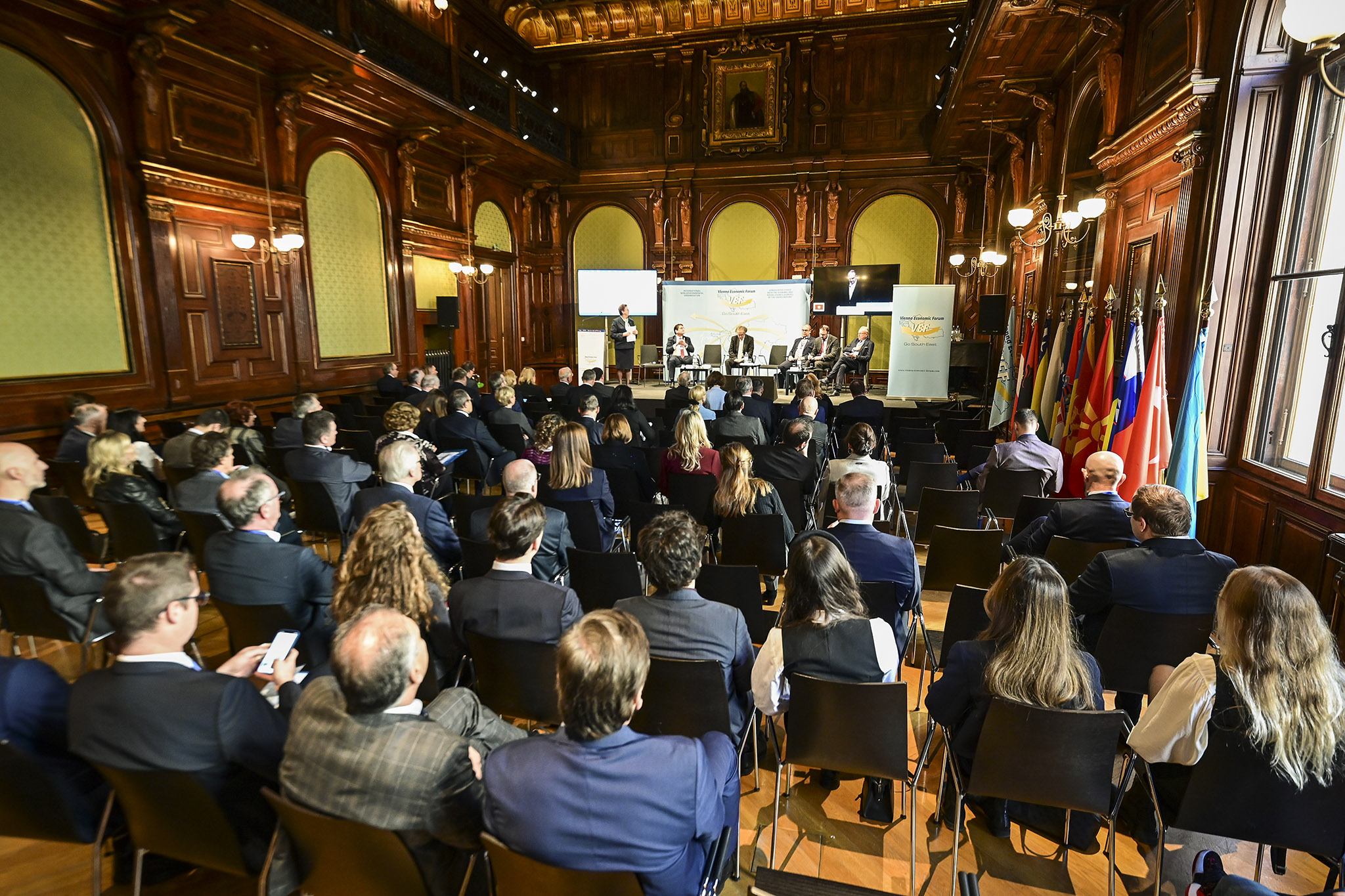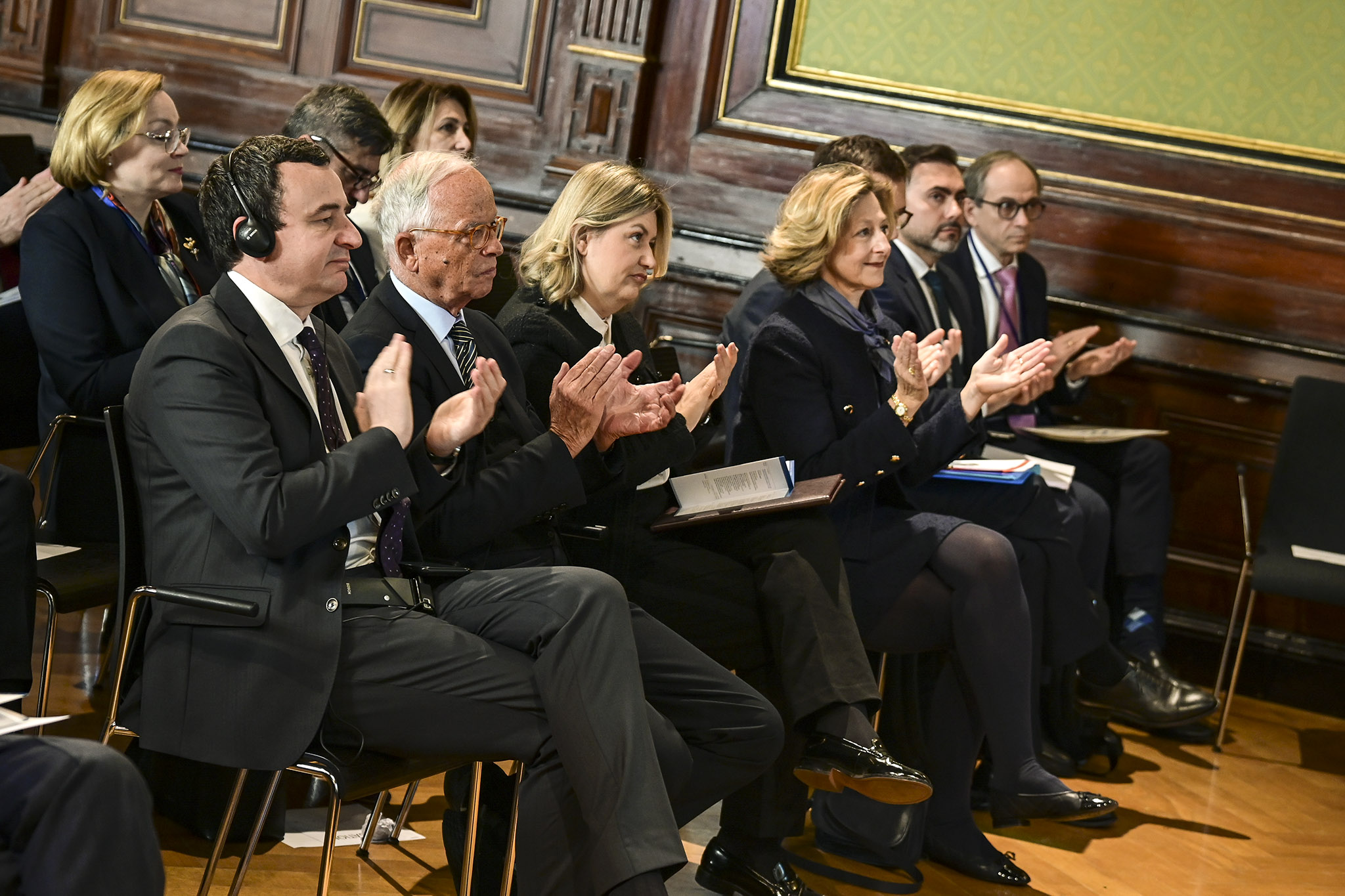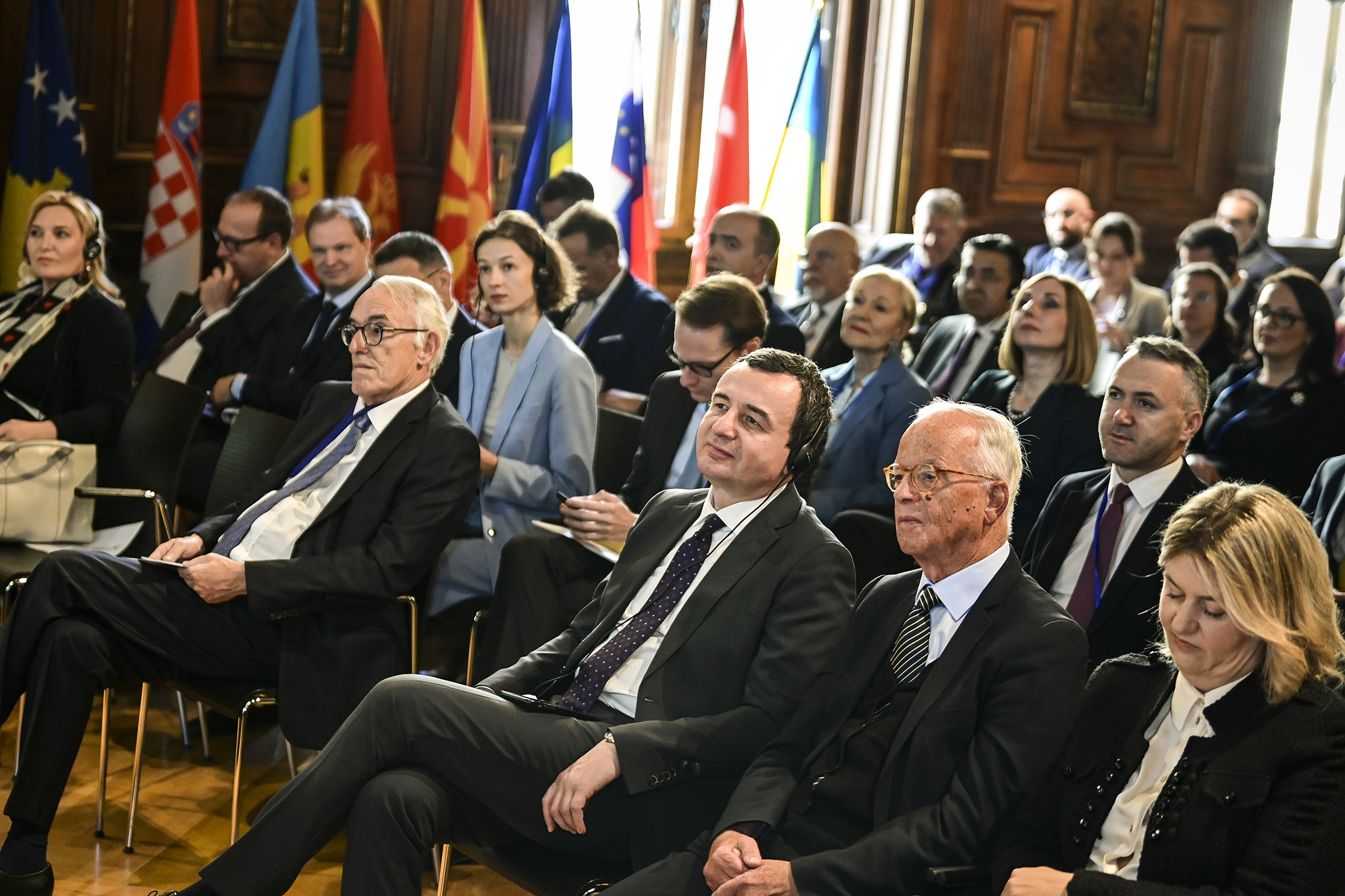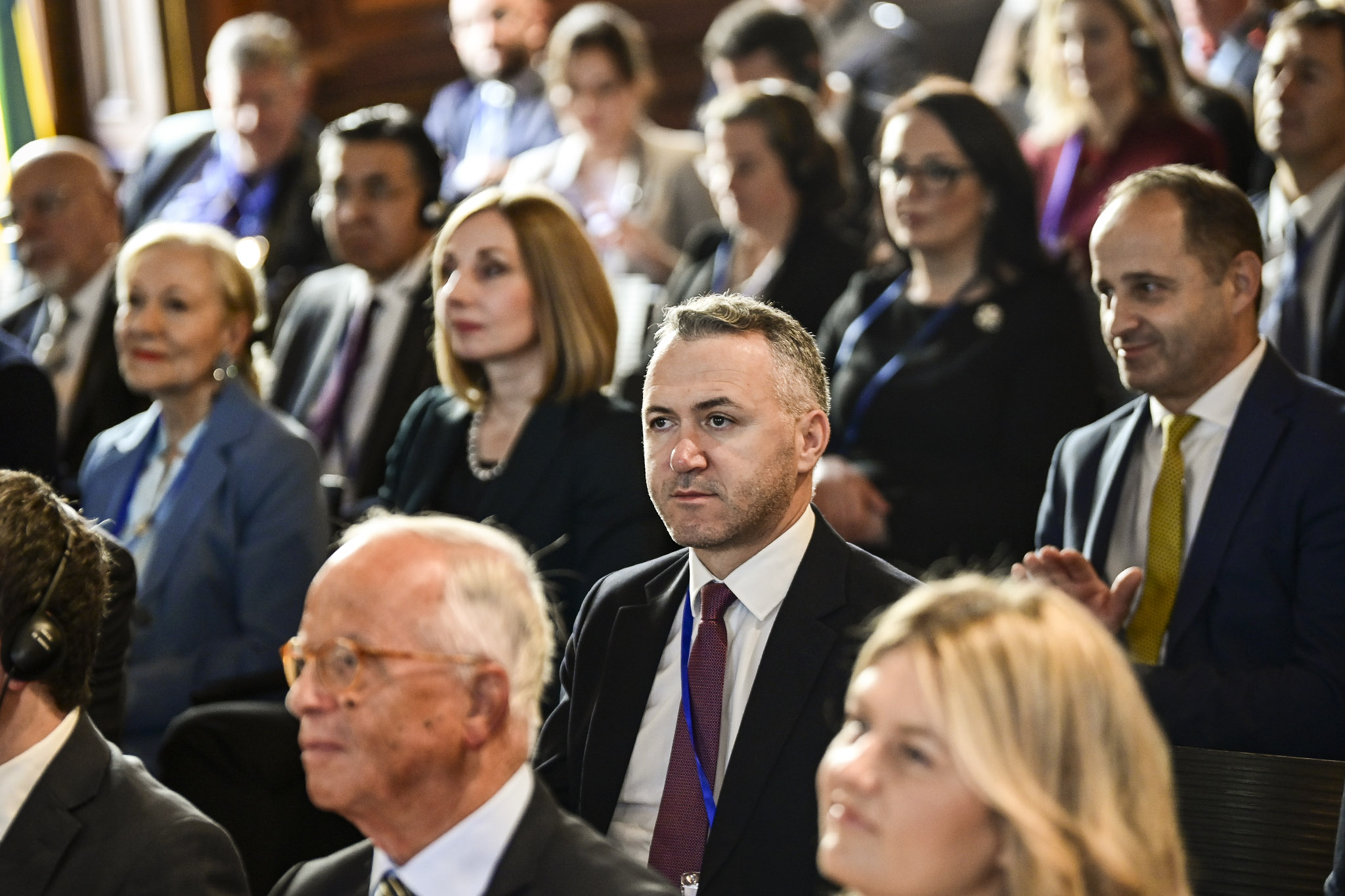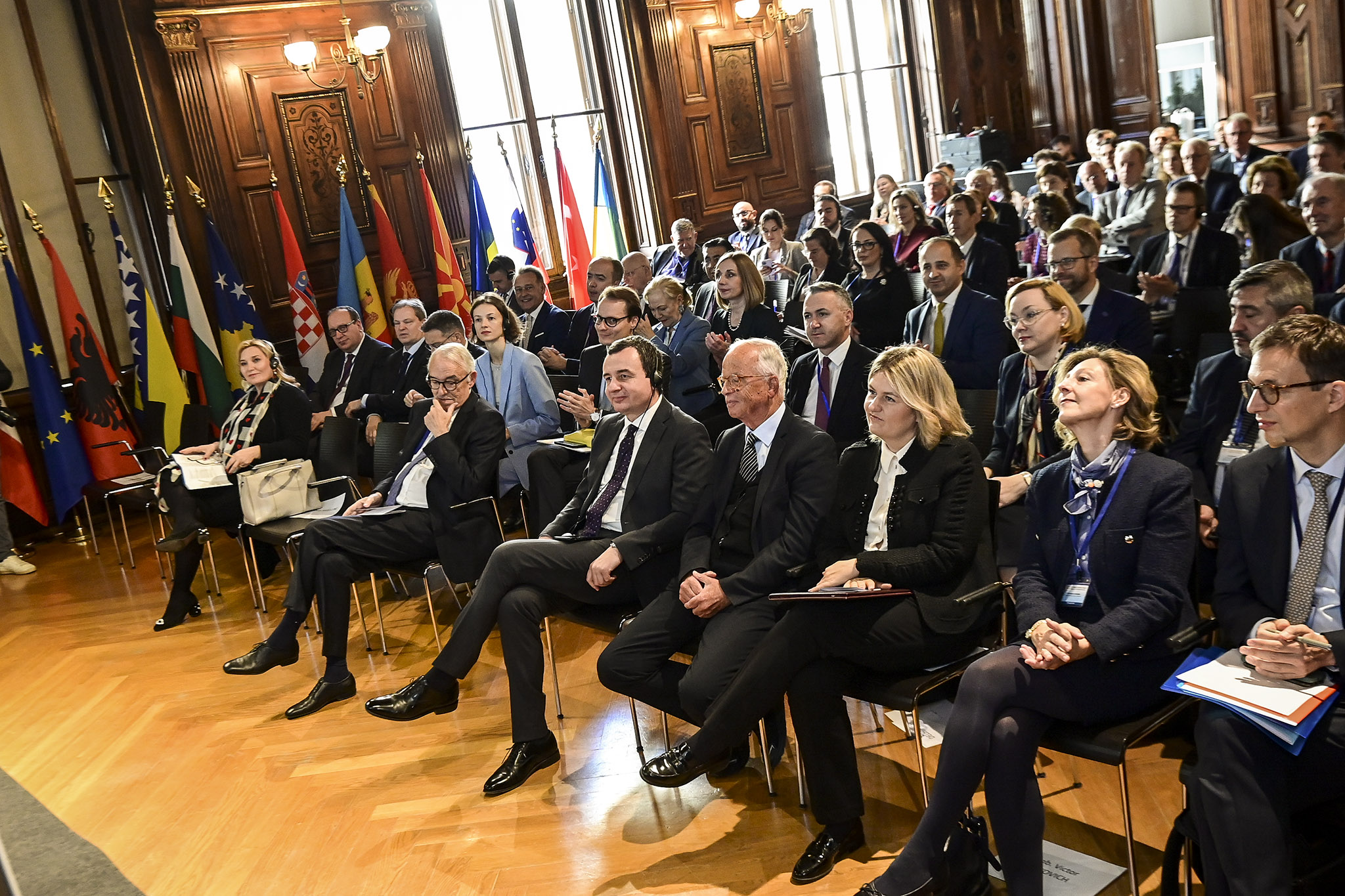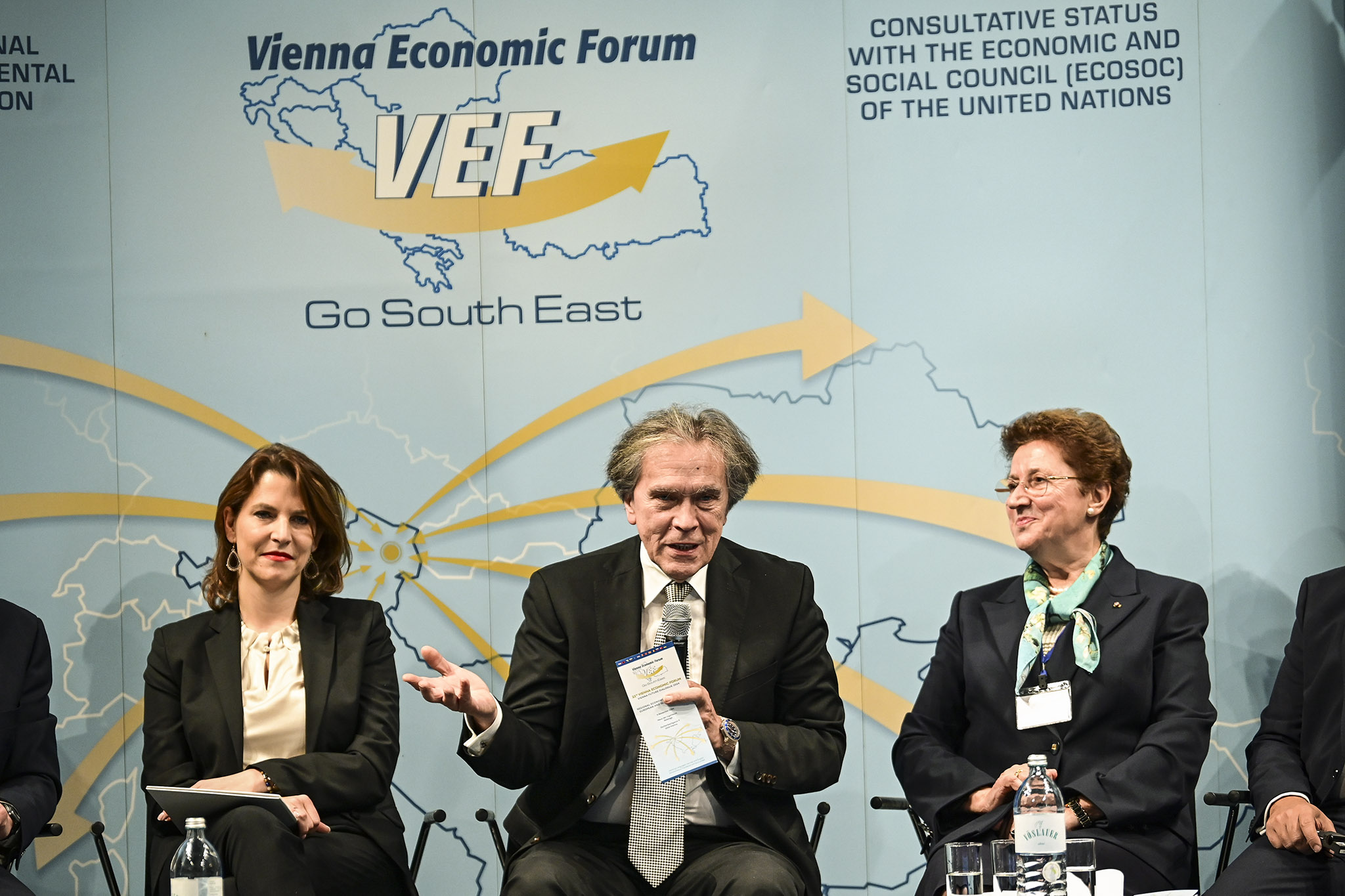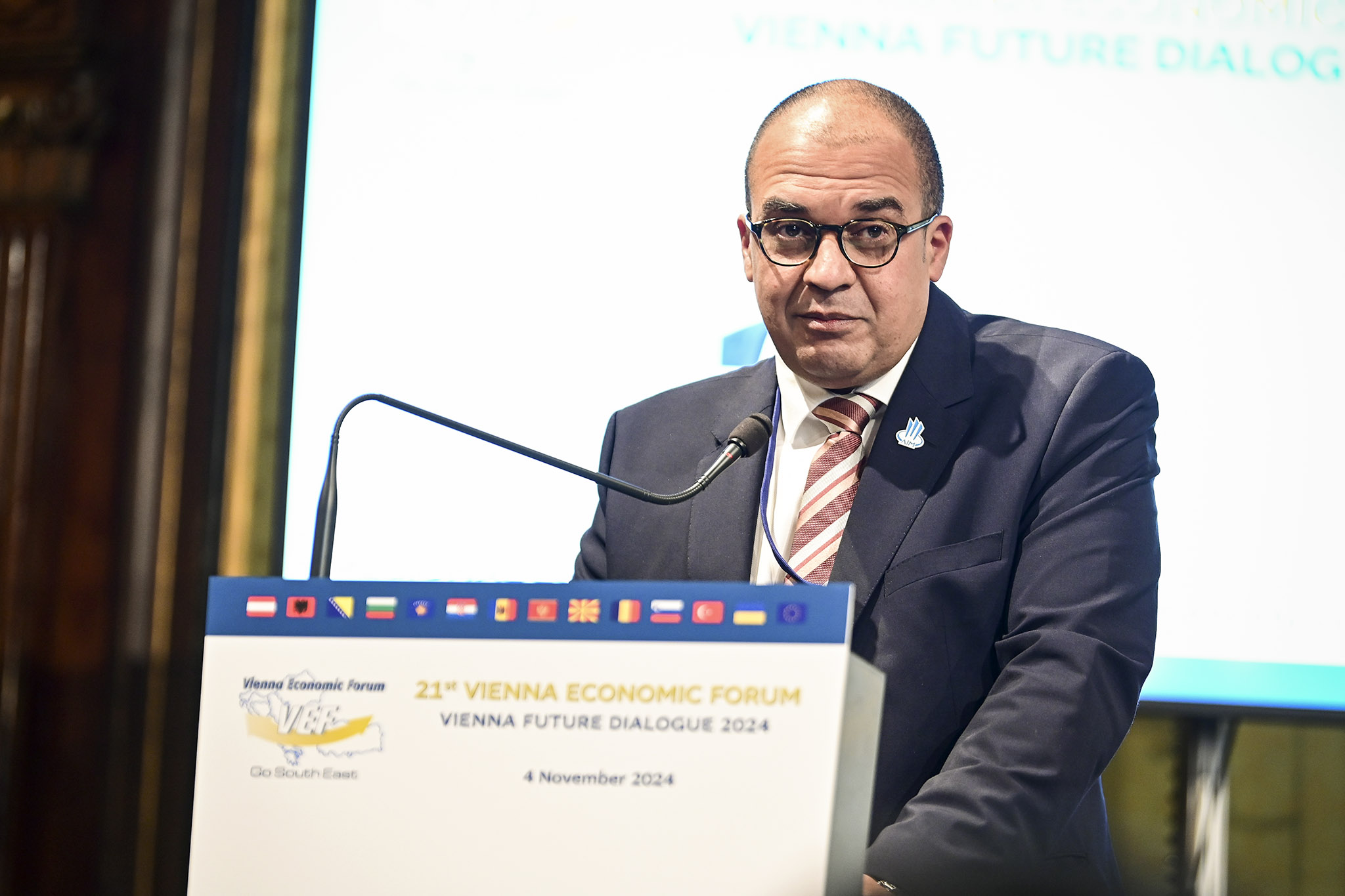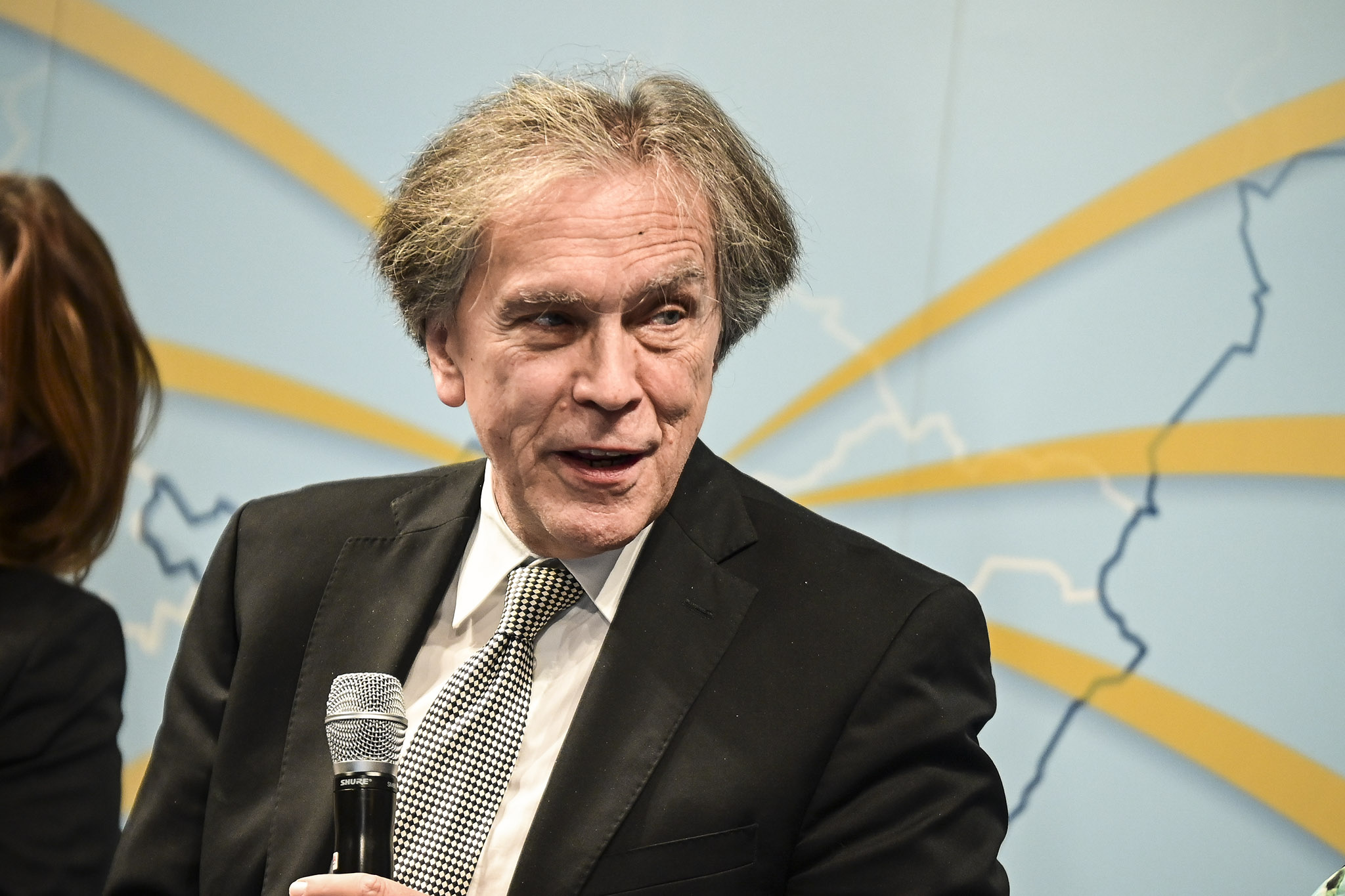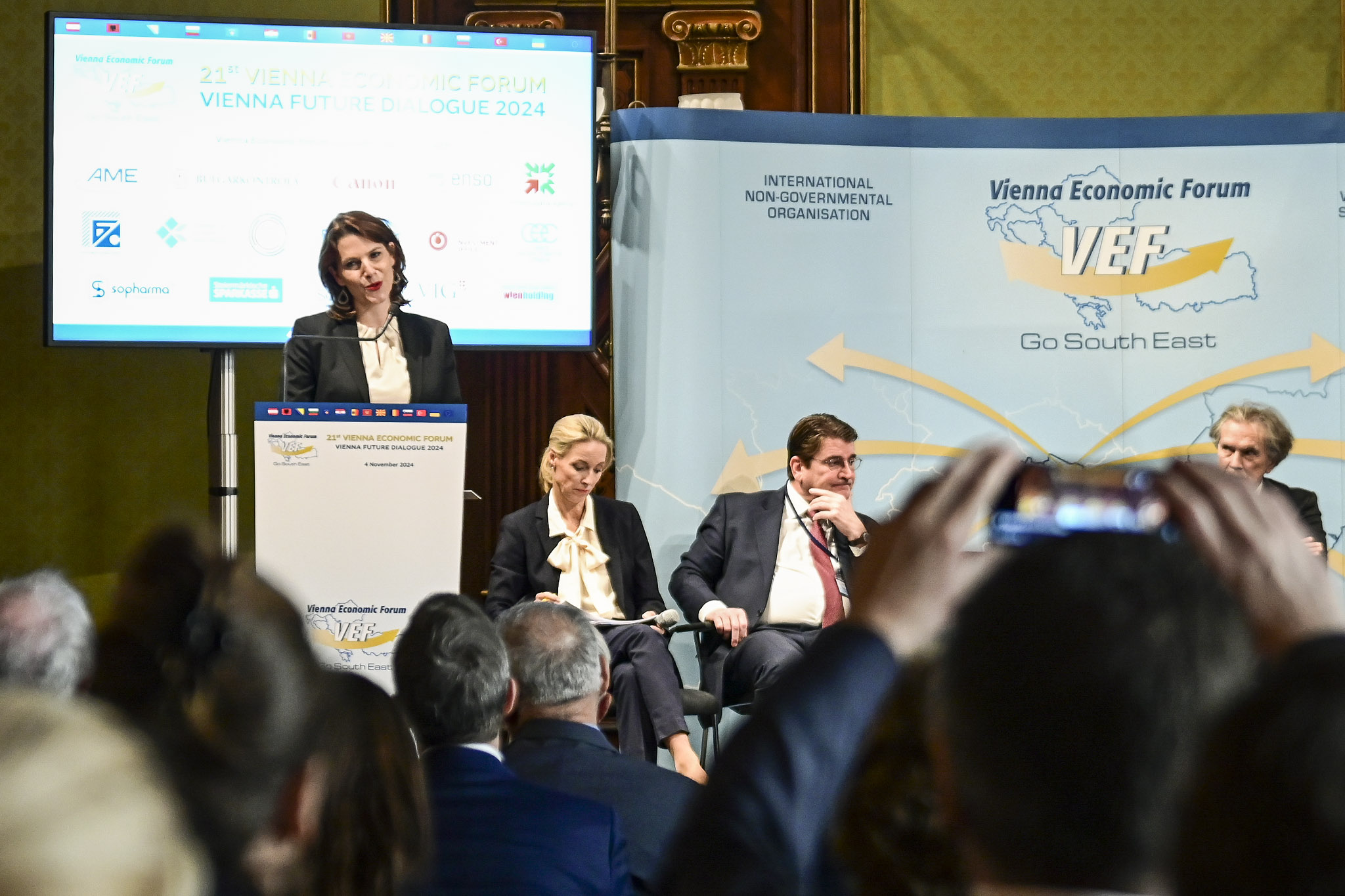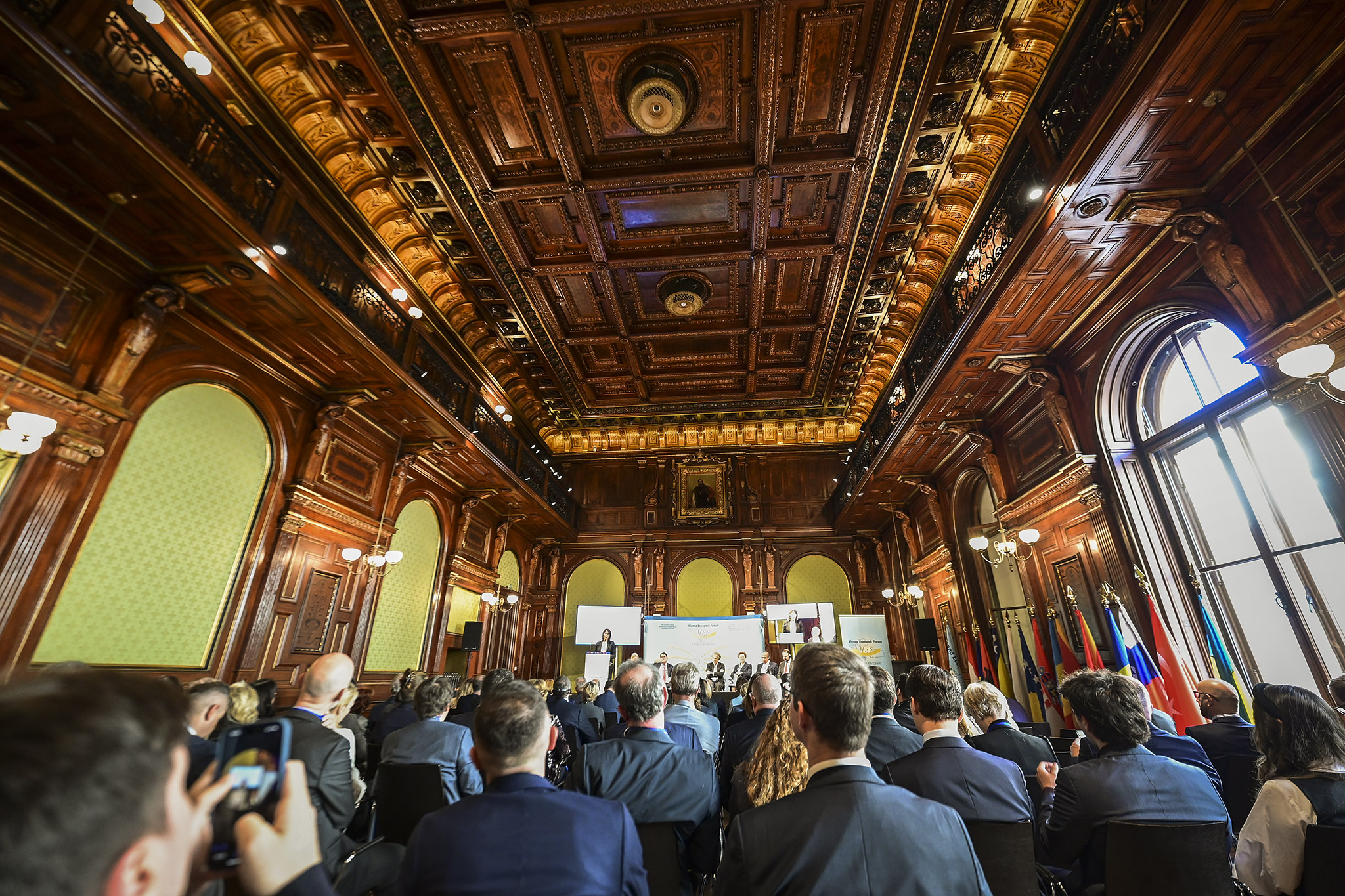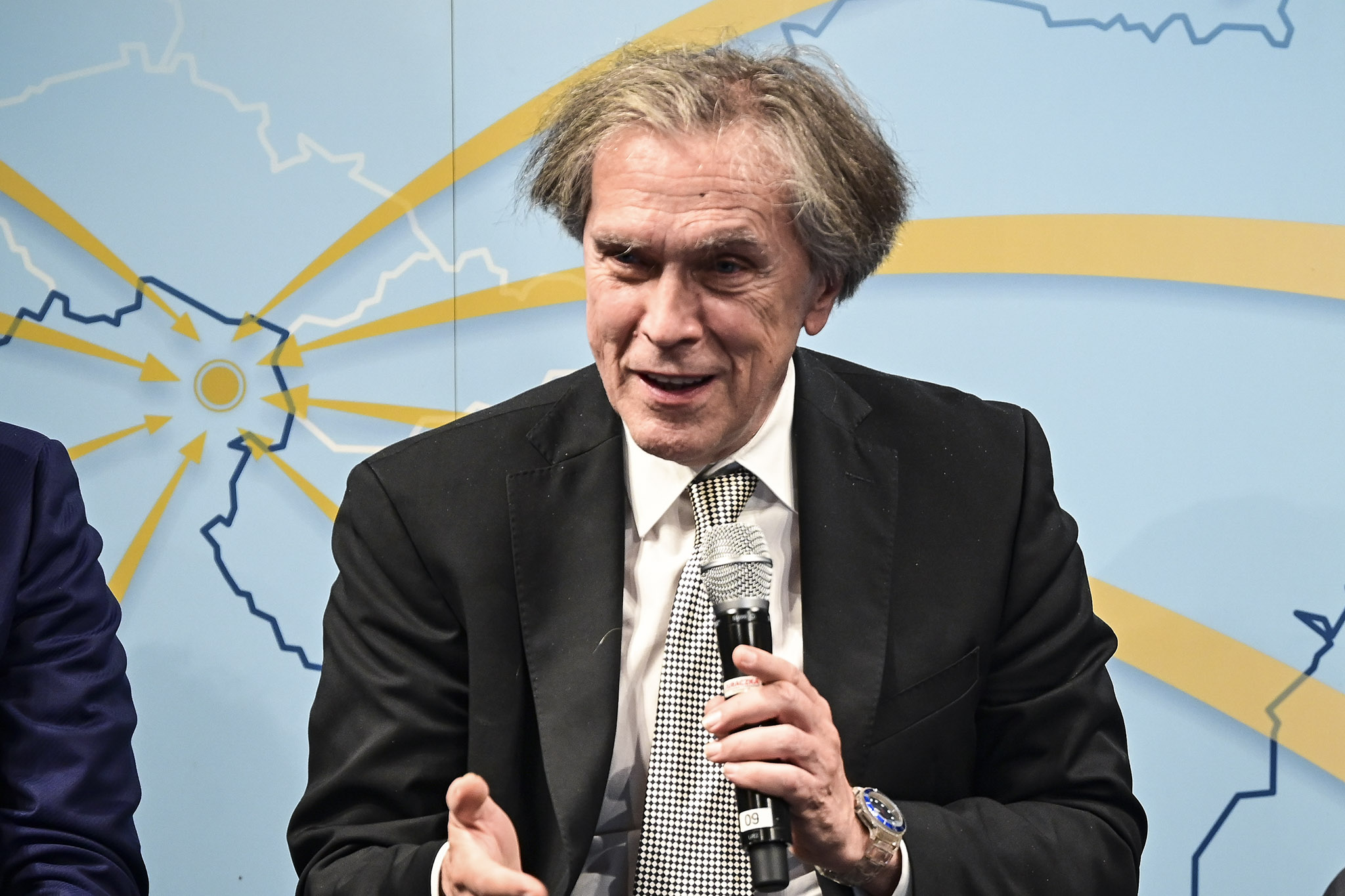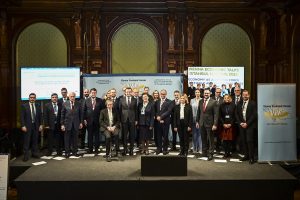Vienna, 4 November 2024
The Prime Minister of the Republic of Kosovo, Albin Kurti, participated in the 21st edition of the Vienna Economic Forum. He was the keynote speaker in the afternoon session entitled “Economic cooperation is more important than ever”.
In his introductory address, the prime minister first emphasized the important role of Austria and its partnership with Kosovo before and after the independence of our country.
“As a young country with an unwavering commitment to democracy and economic growth, we believe that partnerships are essential to achieving prosperity and peace, not only within our borders, but throughout our region,” he said.
Underlining the achievement of the agreement on Free Trade with EFTA member states and the advancement in the representation of Kosovo in CEFTA, he stated that for Kosovo, economic cooperation is not only a political choice; it is a strategic imperative. Our success and progress depends on our ability to create an environment that fosters cross-border trade, attracts investment and builds bridges with neighboring countries, he further stated.
On this occasion, the prime minister also spoke about the importance of regional cooperation and the successful 10th anniversary of the Berlin Process. He singled out the announcement he made during the summit proceedings in Berlin regarding the decision that starting from January 1 next year, Kosovo will unilaterally allow citizens of Bosnia and Herzegovina with identity cards to travel to it, such as it is foreseen with the mobility agreement signed in Berlin two years ago within the framework of the Berlin Process. Because without freedom of movement, as the Prime Minister said, we will not be able to increase the mobility of workers, students and professionals, which is essential both for attracting foreign direct investments and for the growth of our economies.
He said that we need economic cooperation, not only because it gives us stability to face crises and shocks, but because we want to remove barriers and create new opportunities for our citizens.
“When people think in terms of economic cooperation, they should think more about opportunities and benefits than about challenges and risks. And we have shown that we are the standard bearers when it comes to rules and values. In recent years, we have shown that democracy and the economy go hand in hand. Today there are some powers and superpowers in the world that want to show that there is no need for democracy. Our country is not a big country, but it is a great example of democratic progress and growth economic ones go hand in hand, and in fact they strengthen each other”, emphasized the country’s prime minister.
He supported this with economic performance indicators, social policies, support for citizens, employment, increased pensions, wages and minimum wage, at the same time when we have shown progress and improvement in democracy, rule of law, civil liberties and political rights, as evidenced in international change reports.
However, the progress of our country is related to the progress of our neighboring countries, therefore we are committed to work together because we believe that we all benefit when the region is more prosperous and safer, the Prime Minister emphasized. With the exception of our northern neighbor, all the countries of the Western Balkans are either part of NATO or have NATO within them, and they all want to join the European Union, he added.
“This is why economic cooperation and integration cannot only be about growth statistics and trade agreements. It is also about fostering democratic stability within countries and the solidarities of democracies between countries. We do not see economic cooperation as a zero-sum game, but as an opportunity for joint achievements Sustainable partnerships are those based not on amenities or goods, but on a shared commitment to the values of democracy, human rights and the rule of law let’s do democracy and the economy together, I believe we gain what we need most: economic security while preserving human dignity”, said Prime Minister Kurti at the end of his speech.
After the initial address, Prime Minister Kurti was part of the discussion panel. At the end of the Forum, Prime Minister Kurti, namely the Republic of Kosovo, was awarded the “Partner country for 2024” award for his invaluable contribution to fulfilling the mission of the Vienna Economic Forum and for excellent and long-term cooperation.
Honorable President, Dr. Emil Brix.
Dear esteemed colleagues from this panel
Ladies and Gentlemen,
I am glad to be here in the beautiful city of Vienna that has long been a hub of diplomacy, culture, economy and intellectual exchange. It is here were intellectuals, artists, and political thinkers from across Europe were drawn.
Between 2006 and 2007, negotiations on Kosova’s status took place here, mediated by UN Special Envoy and Nobel Peace Prize winner Martti Ahtisaari, whose right hand man was Albert Rohan.
Austria is a steadfast partner of Kosova, both before and after the independence of our country, and has offered us support and assistance in a number of fields, from economic development to cooperation in security. Foreign investments have consistently shown significant growth from Austria, increasing over five times in the last four years.
I will speak today on the topic of “Economic Cooperation”, which is a theme that matters to our country and our region.
As a young country with a steadfast commitment to democracy and economic growth, we believe that partnerships are crucial to achieving prosperity and peace, not only within our borders but across our region.
The benefits of cooperation are evident. Before becoming a member of the European Union in 1995, Austria was part of the European Free Trade Association (EFTA) for 35 years, which played a significant role in paving the way for Austria’s EU membership and steady economic growth. We have just this summer concluded successfully negotiations for EFTA, by including also services and we are very happy to sign that agreement in the next couple of months’ time
Kosova is, in addition, part of the Central European Free Trade Agreement known as CEFTA. After recent decisions, including Kosova’s direct representation, it holds the promise of moving the region much faster towards the Single Market and full membership in the European Union.
For us, economic cooperation is not just a policy choice; it is a strategic necessity. Our success and progress hinge on our ability to create an environment that fosters cross-border trade, attracts investment, and builds bridges with neighboring countries.
Last month on the 10th anniversary of the Berlin Process, in Berlin I announced that Kosova will enable freedom of movement for all holders of ID cards of Bosnia and Herzegovina. This will end the long wait and the expensive procedures of needing a visa to travel freely. Of course, I hope that in the remaining time, Bosnia and Herzegovina will be able to ratify the Berlin Process Agreement so that even earlier citizens of both our countries can move freely with ID cards. But even if they do not do this, from 1st of January 2025, all citizens of Bosnia and Hercegovina will be able to come to Kosova freely with their ID cards. Freedom of movement is one of the four basic freedoms that has enabled the mobility of people across Europe and so must be the case between our two countries. Kosova and Bosnia and Herzegovina who suffered greatly, especially in the late ‘90s. Because without the freedom of movement we will not be able to get the mobility of workers, students and professionals which is key to both attracting foreign direct investments and growing our economies.
Similarly, our northern neighbor, Serbia must allow foreigners whose destination is Kosova to also be able to go to Serbia afterward. Unfortunately, whoever comes from Austria to Kosova as first entrance, cannot continue (travel) to Serbia without going first to North Macedonia, because from the perspective of official Belgrade entering Kosova first means illegal entry in the territory of Serbia. For good neighborly relations, for economic cooperation this has to be changed.
In Berlin, I also said that 25 years after NATO’s intervention, Serbia’s airspace remains closed for commercial flights to and from Kosova. This is neither good for neighborly relations, for economic cooperation nor for climate adaptation. Flights from Vienna to Prishtina and vice versa could be much shorter and pollute less if Serbia allows commercial planes whose destination is Prishtina to fly through Serbia’s airspace.
So, yes agreements that remove barriers to trade are essential but they rest upon good cooperation, good faith and good intentions.
Through Common Regional Market we are moving in the direction where we not only will be able to access a broader market but also to integrate our economy with our neighbors. This will help businesses in Kosova gain exposure, scale up, and become more competitive. By eliminating tariffs, harmonizing standards, and promoting the free movement of goods and services, we become much stronger economically, create new jobs and support our local industry.
Yet, Common Regional Market and CEFTA are only the bridge, but we need to build further on them. We aspire to enhance this regional collaboration in ways that address both longstanding and emerging challenges. My country, like many countries, has felt the impacts of global economic uncertainties and supply chain disruptions, especially in recent years.
We need economic cooperation, not just because it gives us the resilience to weather such shocks together but because we want to remove barriers and create new opportunities for our citizens. So when people think in terms of economic cooperation, they should be thinking on possibilities and opportunities rather than on challenges and dangers. And we have shown that we are a standard bearer when it comes to rules and values. In the recent years, we have shown that democracy and economy go hand in hand. Today we have certain powers and superpowers in the world who want to show that development does not need democracy. Our country is not a big country, but is a great example that democratic progress and economic growth go hand in hand, and actually they enforce each other.
The annual economic growth for the period 2008-2020 on average has been 3.65% of GDP whereas for the period 2021-2023 the annual economic growth has been 6.2% of GDP on average. This means that in the last three years we tripled GDP growth – in comparison to first pre-pandemic year, 2019 economy of Kosova grew by almost 50%. We doubled our exports and foreign direct investments; we added 24% new jobs compared to what we found when me took office in 2020 and as a result unemployment fell from almost 26% to around 10%. For us economic growth means social well-being. Growth is not supposed to held back for the state, but should be distributed in the society and create equal opportunities for all. Every 8th euro of our growing economy which was achieved despite multiple crisis, was re-distributed to those most vulnerable who were struggling with the economic crisis – citizens and small businesses. This made us the government with the biggest support package in the region (relative to GDP), as confirmed by the World Bank.
We introduced for the first time allowances for new mothers and children, increased pensions by 20% and more than doubled the minimal wage. All this done without changing fiscal policy and all the while maintaining the lowest public debt in Europe (around 15%), so that we do not develop or grow at the expense of future generations.
Meanwhile, we lead the region for improvement in democracy. We are among top three performers for improvement in the rule of law ranking 3rd out of 15 countries in Eastern Europe and Central. We had the highest improvement in the region in the fight against corruption and together with Montenegro we lead the region for improvements in civil rights and liberties and in liberal and electoral democracy.
I mention these numbers because these are not merely statistics. They show that political choices matter because they directly impact the business climate and the lives of citizens for better or worse.
Kosovo’s future, however, extends beyond regional cooperation alone. The new EU Growth Plan and our alignment with the European Union’s policies present a path forward for us to integrate with one of the world’s largest economic blocs.
The EU Growth Plan offers a clear roadmap for achieving sustainable development through investments in key areas such as infrastructure, digital transformation, and green energy, priorities which bring us closer to our aspiration of becoming a modern, knowledge-based economy, ready to join the EU.
With average age of population 34, we have a young and dynamic workforce that can drive innovation and entrepreneurship if given the right support. Youth in Kosova every one speaks English, many of them speak German as well and quite some speak languages of our neighborhood; Bosnian, Croatian, Serbian and some also speak Turkish. With energetic, talented, multilingual youth we offer a great opportunity for business process outsourcing and for ever increasing economic investments and trade exchange.
Each euro invested in infrastructure, each project funded in renewable energy, represents an opportunity for us to create jobs and provide the next generation with the skills and opportunities they need to thrive in the 21st century, but also for foreign companies to grow and profit.
But this isn’t just about Kosova. Our country’s progress is interlinked with the progress of our neighbors. You cannot forever shine in a neighborhood without the entire neighborhood shining alike. To that end, we are committed to working together, because we believe that we all stand to gain when the region is more prosperous and more secure. All the countries of Southeast Europe when looked at from big western and world corporations, they see us part of the same neighborhood, and to that end we have to increase our cooperation.
With the exception of our norther neighbor unfortunately, all countries of Western Balkans are either part of NATO or have NATO part of us and we all want to join the European Union. As a region, I believe we would be advancing a lot faster towards membership in the EU if it wasn’t for the certain autocratic tendencies, backward looking and expansionist mindset of some.
That is why economic cooperation and integration cannot be solely about growth statistics and trade agreements. It’s also about fostering democratic resilience within the countries and solidarities of democracies across the countries. We do not see economic cooperation as a zero-sum game, but as an opportunity for joint achievements.
Lasting partnerships are those that are based not on convenience or a commodity, but on a shared commitment to the values of democracy, human rights and the rule of law. When we join democracy and economy, I believe we gain what we need most: economic security while preserving human dignity.
Our relations with European Union in general, and with Austria in particular, are based on such foundations. They are strong and lasting, and we will work hard to have them every grow more and better.
Thank you for your attention and I want to thank Vienna Economic Forum and for bringing us together more than once per year.
Thank you.

